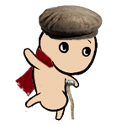|
Also, for sacking Koln, keep in mind that we're currently allied to the Germans. Not loving with the Germans right now can yield many benefits (mostly loving with non-Germans right now).
|
|
|
|

|
| # ? May 16, 2024 19:52 |
|
Whoever said taking Catholic holy sites doesn't trigger crusades is a filthy liar, btw.
|
|
|
|
In fairness I did say "if the wiki is correct."
|
|
|
|
S'all good. Update in two-ish days, just finished playing the next thirty years. Preview: 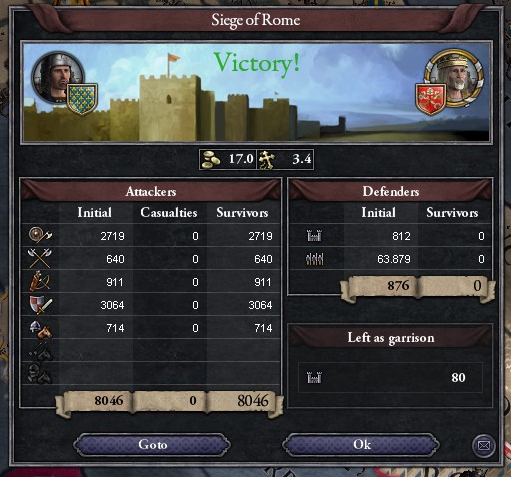
|
|
|
|
Update 8 - Uneasy Lies the Head that Wears the Crown Madame de Beaumont lies in her hammock, listening to the waves. The galley drifts ever forward, rocking her gently. It doesn't help. At her age, sleep is rare and precious. Tonight is a night when sleep does not come. Her bones ache, her skin itches, and her mind is trapped in old memories. A tall figure stands besides her, silent and unseen. M. Naturelle demands his toll. Resigned to her fate, Mme de Beaumont spins her tale.   : The first years of Creat's reign were dangerous. His aunt died, and his new heir was distant kin, living in the Muslim lands. : The first years of Creat's reign were dangerous. His aunt died, and his new heir was distant kin, living in the Muslim lands.  : Nobles loyal to my uncle pointed to this as proof that God wishes to see him back on the throne. They would never submit to a Sunni. : Nobles loyal to my uncle pointed to this as proof that God wishes to see him back on the throne. They would never submit to a Sunni.  : To dissuade them from open rebellion, Creat raised an army to march on a small county on the Western coast. It used to be a part of Karling realms decades ago, and le Roi hoped it would unite the people. : To dissuade them from open rebellion, Creat raised an army to march on a small county on the Western coast. It used to be a part of Karling realms decades ago, and le Roi hoped it would unite the people.  : It did not. And with a heavy heart, le Roi did what he had to. Nicolas was given Consolamentum by a travelling Bon Homme, and he was given to the headman. : It did not. And with a heavy heart, le Roi did what he had to. Nicolas was given Consolamentum by a travelling Bon Homme, and he was given to the headman. : I felt nothing for him. : I felt nothing for him.  : The death of my uncle did not stop the nobles from scheming. Many openly called Creat a tyrant, and found the nearest Karling that had a claim to France. The King had to fight the court in courtly ways. : The death of my uncle did not stop the nobles from scheming. Many openly called Creat a tyrant, and found the nearest Karling that had a claim to France. The King had to fight the court in courtly ways.  : It was nothing new to him. He sent me to befriend my cousin, and find any secrets that would turn the court against him. : It was nothing new to him. He sent me to befriend my cousin, and find any secrets that would turn the court against him.Madame de Beaumont closes her eyes, as the memory overtakes her. The figure is patient.  : I think this is when I should have realized he's grown bored of me. But I was young and stupid. : I think this is when I should have realized he's grown bored of me. But I was young and stupid.  : Creat did not move fast enough. A minor count called for his head in the middle of court, and declared war when he was denied. : Creat did not move fast enough. A minor count called for his head in the middle of court, and declared war when he was denied.  : Of course, a King is not a King unless he deals with at least three problems at once. The recently conquered Reims has spent enough time under the Muslims that they embraced their way. They wished to return to worshipping Allah in the open. : Of course, a King is not a King unless he deals with at least three problems at once. The recently conquered Reims has spent enough time under the Muslims that they embraced their way. They wished to return to worshipping Allah in the open. : Combined, all those armies could have easily destroyed Creat. Thankfully, they hated each other as much as they hated the crown. : Combined, all those armies could have easily destroyed Creat. Thankfully, they hated each other as much as they hated the crown.  : The King rode south with his entourage. When we breached the walls of Deols, he was the first one into the breach, fighting like a madman. Some said they saw a wolf tear through the crowd, only to turn into le Roi when it was all over. : The King rode south with his entourage. When we breached the walls of Deols, he was the first one into the breach, fighting like a madman. Some said they saw a wolf tear through the crowd, only to turn into le Roi when it was all over.  : Our letters continued. He wrote of the treaty with the Lollards. I wrote of the comfort of my cousin's bed. : Our letters continued. He wrote of the treaty with the Lollards. I wrote of the comfort of my cousin's bed.  : His next reply was far less courteous than the one before. Have I finally gotten through to him? Was he jealous? : His next reply was far less courteous than the one before. Have I finally gotten through to him? Was he jealous?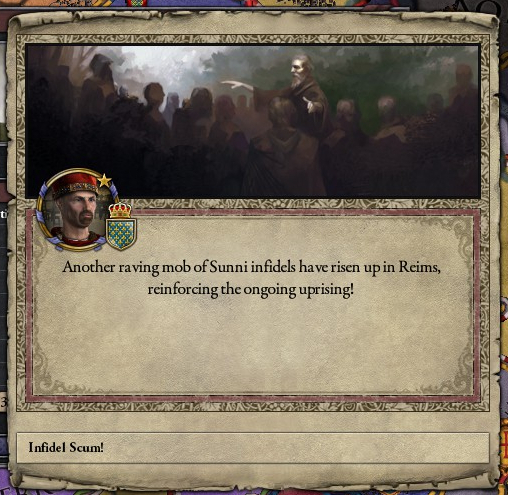  : He wrote that the heathens inside his own land were flocking to the bastard general's standards. Half of Reims stood against him. : He wrote that the heathens inside his own land were flocking to the bastard general's standards. Half of Reims stood against him.  : On his way to the Sunnis, they ran into the army the Pierrites could muster. They were not many. : On his way to the Sunnis, they ran into the army the Pierrites could muster. They were not many.  : I have heard the preachers in Rouen city square praise the wolf-king, who held against the heathen at Verdun. Who leaped across the battlefield, and tore the throat of the heathen general. : I have heard the preachers in Rouen city square praise the wolf-king, who held against the heathen at Verdun. Who leaped across the battlefield, and tore the throat of the heathen general.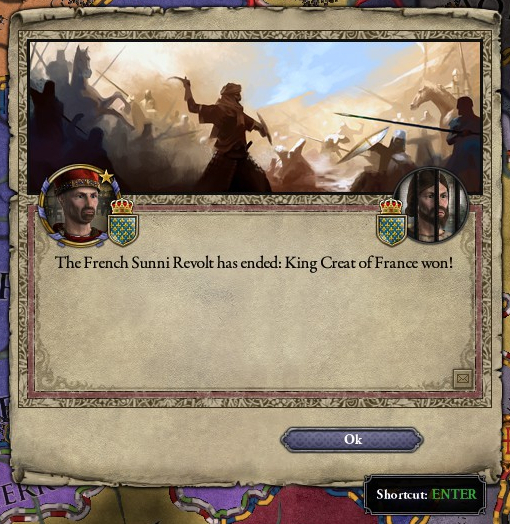  : True or not, the Sunnis were broken. They would go back to their homes, after praising the Lord Jesus and taking the Consolamentum. : True or not, the Sunnis were broken. They would go back to their homes, after praising the Lord Jesus and taking the Consolamentum.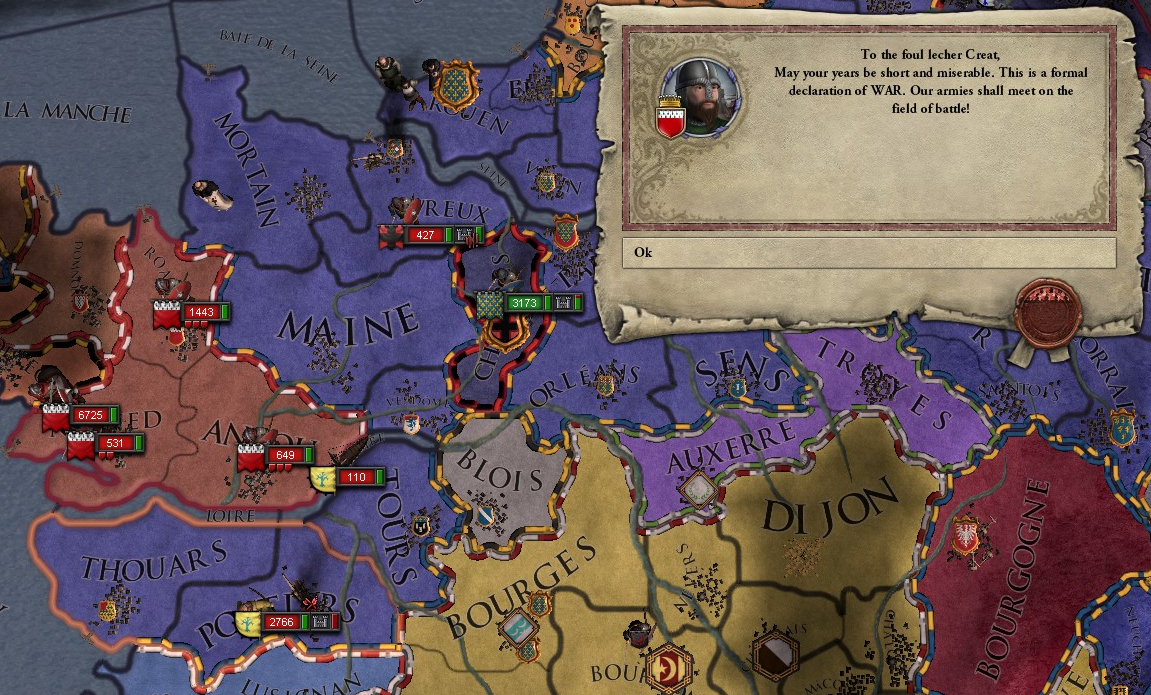  : Of course, this was the perfect time for the Nantesians to the west to claim a holy war against Cathar lands. And they had plenty of holy warriors. : Of course, this was the perfect time for the Nantesians to the west to claim a holy war against Cathar lands. And they had plenty of holy warriors.  : Creat's next letter was urgent. I was to visit the council of Jewish merchants, and borrow as much as I could. : Creat's next letter was urgent. I was to visit the council of Jewish merchants, and borrow as much as I could.  : I was then to pay it to as many mercenary commanders as would take arms against the Catholics. : I was then to pay it to as many mercenary commanders as would take arms against the Catholics.  : But I was not fast enough. As I arranged for the troops to be supplied, and as the marched, the West burned. : But I was not fast enough. As I arranged for the troops to be supplied, and as the marched, the West burned.  : The next letter was joyful. Creat laughed as he wrote that the broken nobles have sent him a peace envoy, begging to be spared the diginity of a complete surrender. : The next letter was joyful. Creat laughed as he wrote that the broken nobles have sent him a peace envoy, begging to be spared the diginity of a complete surrender.  : I would not have my King make peace with scum. A whisper in the dark, and Pierre woke up with a dagger in his throat. My man was captured and tortured. He broke too soon and spoke my name. And the King's. : I would not have my King make peace with scum. A whisper in the dark, and Pierre woke up with a dagger in his throat. My man was captured and tortured. He broke too soon and spoke my name. And the King's. : And yet the nobles had no one to fight for. : And yet the nobles had no one to fight for.  : Fearing persecution, I fled the capital. I rejoined le Roi at his tent, as he questioned a Breton priest lord. He told us that the Nantes coffers ran dry, and their mercenaries deserted them. With a smile, Creat ordered a march on their capital. : Fearing persecution, I fled the capital. I rejoined le Roi at his tent, as he questioned a Breton priest lord. He told us that the Nantes coffers ran dry, and their mercenaries deserted them. With a smile, Creat ordered a march on their capital.  : We rode into Nantes together, as our soldiers pillaged the city. The count of Nantes kneeled before us, and surrendered. Our soldiers gave three howls for le Roi as he pardoned the Catholic scum. : We rode into Nantes together, as our soldiers pillaged the city. The count of Nantes kneeled before us, and surrendered. Our soldiers gave three howls for le Roi as he pardoned the Catholic scum. 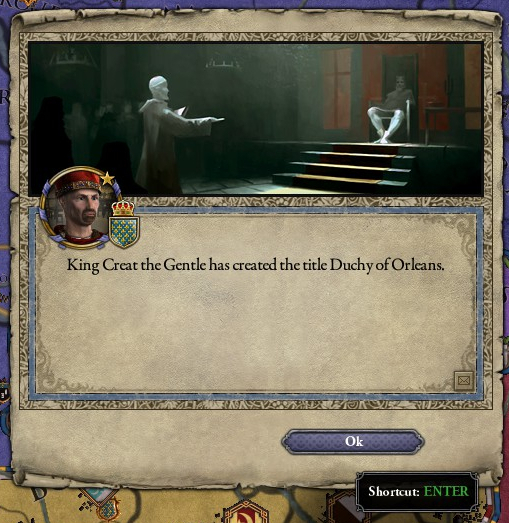  : As he returned to Rouen, le Roi announced that the southern territories, recovered from the Muslims, were to be organized into the Duchy of Orleans, and that a distant cousin of his would rule it. : As he returned to Rouen, le Roi announced that the southern territories, recovered from the Muslims, were to be organized into the Duchy of Orleans, and that a distant cousin of his would rule it.  : He then settled his debts with the Jews, paying them back with extraordinary interest. : He then settled his debts with the Jews, paying them back with extraordinary interest.  : To celebrate his glorious victories against his many enemies, le Roi announced a grand tournament. : To celebrate his glorious victories against his many enemies, le Roi announced a grand tournament.  : He then sent me to Evreux, to declare to the count that he no longer held the title that was rightfully Creat's. It did not go well. : He then sent me to Evreux, to declare to the count that he no longer held the title that was rightfully Creat's. It did not go well.  : Enraged that his celebration is to be delayed, he raised his armies and marched on the castle. : Enraged that his celebration is to be delayed, he raised his armies and marched on the castle.  : On his march there, he found a new girl, Romilda. She joined him in his tent, and he was no longer angry. : On his march there, he found a new girl, Romilda. She joined him in his tent, and he was no longer angry. : Prick. : Prick.  : I remained in Rouen, having been pardoned by that ungrateful dick, and took care of sending him the news again. More Cathars, less Catholics. : I remained in Rouen, having been pardoned by that ungrateful dick, and took care of sending him the news again. More Cathars, less Catholics.  : His great-aunt's death, and another Muslim was his heir because of the backwards laws of the shithole he called home. : His great-aunt's death, and another Muslim was his heir because of the backwards laws of the shithole he called home.  : Having taken Evreaux and every noble in it, he rode back, making frequent stops with his new toy. : Having taken Evreaux and every noble in it, he rode back, making frequent stops with his new toy.  : Curiously enough, the wife of the former Comte d'Evreaux was of a cadet branch of my House. Traced her lineage from a bastard son of Karl. : Curiously enough, the wife of the former Comte d'Evreaux was of a cadet branch of my House. Traced her lineage from a bastard son of Karl.  : The royal tournament resumed. I no longer had the royal box. I had to sit in the stands, with the peasants. That slut sat next to him. : The royal tournament resumed. I no longer had the royal box. I had to sit in the stands, with the peasants. That slut sat next to him.  : I saw him fight in the melee. Much as I hated him then, I feared what I saw. He moved like a wolf stalking his prey. I saw him disarm one opponent after the other. He fought a warrior from Lorraine without a sword, just lunging at his throat with his gauntlet. None were his equal. : I saw him fight in the melee. Much as I hated him then, I feared what I saw. He moved like a wolf stalking his prey. I saw him disarm one opponent after the other. He fought a warrior from Lorraine without a sword, just lunging at his throat with his gauntlet. None were his equal.  : As the horse and rider crashed into each other, le Roi spoke to his chancellor. It seemed some old documents were found, proving that all of Normandy belongs to the Batemanns, and therefore le Roi. : As the horse and rider crashed into each other, le Roi spoke to his chancellor. It seemed some old documents were found, proving that all of Normandy belongs to the Batemanns, and therefore le Roi.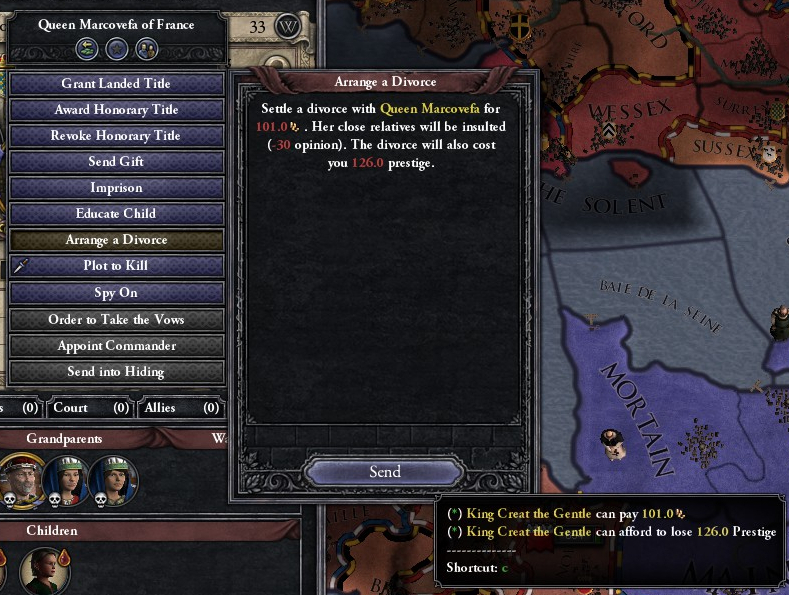  : And then he did it. He divorced his wife, Marcofeva, who put up with his bullshit for a decade, and married that trollop! : And then he did it. He divorced his wife, Marcofeva, who put up with his bullshit for a decade, and married that trollop!Madame de Beaumont shoots up in her hammock, and grips the captain's hand. She stares under the hood, her eyes seeing nothing, her rage engulfing her completely.   : He married her! He made that bitch his legal wife! His queen! That German Delilah! : He married her! He made that bitch his legal wife! His queen! That German Delilah!She releases the hand, and falls back onto her pillow. She sobs quietly, the wound burning as great it was five hundred years ago. The figure waits.   : I... apologize. Where was I? Ah yes, le Roi issued an edict. Middle Francia could hold no more claim to Lorraine, for none alive had ever seen it as anything but France. : I... apologize. Where was I? Ah yes, le Roi issued an edict. Middle Francia could hold no more claim to Lorraine, for none alive had ever seen it as anything but France.  : A mayor from a small town in Lorraine was passing through the woods outside the capital. She was found dead, her body half-eaten. : A mayor from a small town in Lorraine was passing through the woods outside the capital. She was found dead, her body half-eaten.  : Under the advice of his new queen, He warred for the rest of Champagne. But he did not call for a holy war against all the Muslims, but merely the count of Troyes. : Under the advice of his new queen, He warred for the rest of Champagne. But he did not call for a holy war against all the Muslims, but merely the count of Troyes.  : Without help from Hispania, the child count was alone against the might of France. : Without help from Hispania, the child count was alone against the might of France.  : He did not last. : He did not last.  : With his precious bitch whispering into his ear every day, Creat has called for a more organized court. He sat as a judge for all matters brought to the capital. : With his precious bitch whispering into his ear every day, Creat has called for a more organized court. He sat as a judge for all matters brought to the capital.  : He argued that with le Roi as the final authority on legal matters, more funds and troops were needed to support him. : He argued that with le Roi as the final authority on legal matters, more funds and troops were needed to support him.  : Having seen him on the battlefield, the nobles agreed. : Having seen him on the battlefield, the nobles agreed.  : He saw case after case. Peasants arguing about pigs. Nobles arguing about claims. Women accused of witchcraft. : He saw case after case. Peasants arguing about pigs. Nobles arguing about claims. Women accused of witchcraft.  : And he was just in his decisions. Not all who brought their claims to him were happy, but none could say they were not heard. : And he was just in his decisions. Not all who brought their claims to him were happy, but none could say they were not heard.  : One day, a bastard of his came to claim his right as a true son of le Roi, a prince. "There are princes enough in France. What need have we of more princes?", he said. : One day, a bastard of his came to claim his right as a true son of le Roi, a prince. "There are princes enough in France. What need have we of more princes?", he said. 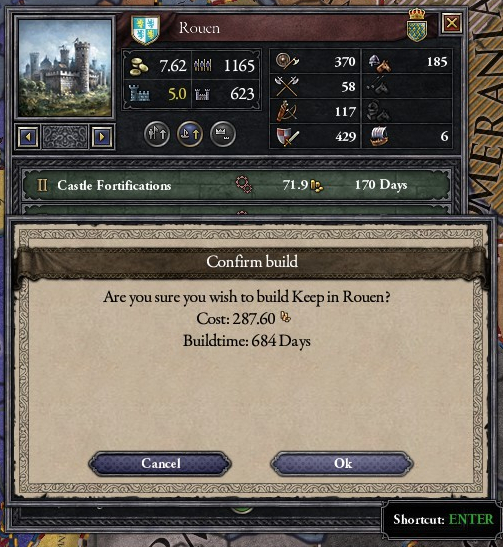  : With Rouen seeing more and more visitors every week, he order the great keep expanded. : With Rouen seeing more and more visitors every week, he order the great keep expanded.  : His sister came to speak to him when he was looking over the plans for a guest wing. She told him how lonely she feels since her husband died. He's hated his sister since they were but children, and he played a cruel joke on her. He granted her marriage, to his nephew, the inbred monster, black of heart. She never forgave him. : His sister came to speak to him when he was looking over the plans for a guest wing. She told him how lonely she feels since her husband died. He's hated his sister since they were but children, and he played a cruel joke on her. He granted her marriage, to his nephew, the inbred monster, black of heart. She never forgave him.  : And yet, she did her duty. She made le Roi want more. Her whispers, and his queen's whispers buried deep into his head. : And yet, she did her duty. She made le Roi want more. Her whispers, and his queen's whispers buried deep into his head.  : As the women were scheming and whispering, the men were learning from them. Four Ducs and a Comte wrote a letter, demanding the return of old rights to his vassals. Creat refused, and marched to war, yet again. : As the women were scheming and whispering, the men were learning from them. Four Ducs and a Comte wrote a letter, demanding the return of old rights to his vassals. Creat refused, and marched to war, yet again.  : A thousand soldiers, men and women both, mustered at the palace, ready to support their King. : A thousand soldiers, men and women both, mustered at the palace, ready to support their King.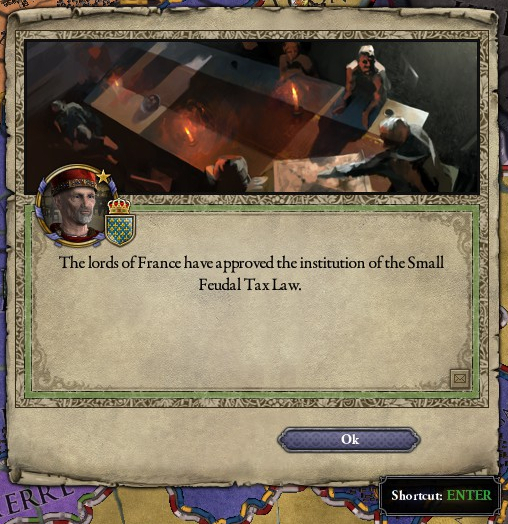  : And with so many nobles branded traitors, le Roi managed to get the rest to agree to a temporary tax, to help with the war. : And with so many nobles branded traitors, le Roi managed to get the rest to agree to a temporary tax, to help with the war.  : The war was short. The taxes remained. : The war was short. The taxes remained.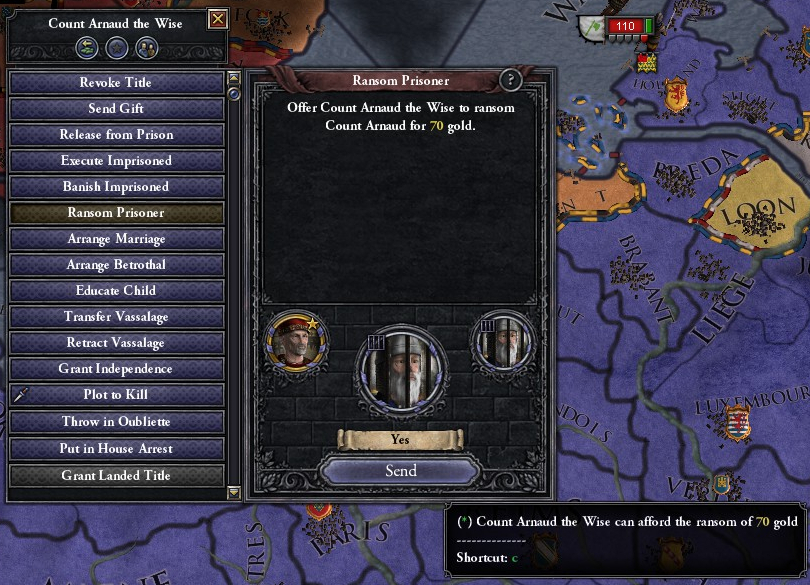  : And yet, le Roi demanded no concessions from the captured Ducs. Just gold. He had plans. : And yet, le Roi demanded no concessions from the captured Ducs. Just gold. He had plans.  : He had finally started to want more. : He had finally started to want more.Madame de Beaumont closes here eyes, and none can wake her from her slumber. But it's enough. The figure disappears into the shadows. The galley moves ever onward.
|
|
|
|
History Update 8 - House of Normandy Last time, we saw Normandy firmly in the hands of a viking raider Rollo, who swore fealty to the Karling king. It's only fair that we begin this week with Rollo's son.  William I was born to Rollo the Viking, Comte de Rouen, and Poppa of Bayeux (yes, Bayeux Tapestry Baeyux), a Christian woman. He succeeded Rollo on his death, and, like his father, recognized the King of West Francia as his lord. In return, Rudolph of France, who was having enough trouble with the Northern territories, granted him dominion over Cotentin (the triangular pennisula where Cherbourg is). Rudolph's reigh was the last little hiccup before Karlings retook control of the crown (before they pissed it away to the first Capet). Anyway, William I fought his way to establish dominion over his Breton lands, and then against Flanders to the east. Unfortunately, by this point, the Kings have changed, and Louis IV retaliated against him. William did enough damage to Flanders to earn the nickname Longsword, and to get his rear end excommunicated. Eventually, while negotiating peace with the Comte of Flanders, he was ambushed and killed in 942.  William's son, Richard I the Fearless started off in a precarious position. Because of his father's death, Louis IV granted much of the Norman lands to Hugh the Great, Comte of Paris. With some carefull politicking, Richard eventually betrayed everyone, allied himself with the Normands and the Vikings, kicked everyone's rear end and took Normandy back. He fought off a small wara aginst another Frankish duke, but ended up mostly focusing on the interior. By the end of his rule, Normandy became properly feudalized. He died in 996.  Richard's successors, Richard II and Richard III were nothing to write home about, and Richard III died of unknown causes while warring with his brother, Robert. Robert was eventually known as the Magnificent. He fought against the church early in his reign, specifically his uncle, who was the Archbishop of Rouen and the Comte of Evreux, and the Bishop of Bayeux. Eventually, they reconciled, and Robert became a pretty devout Christian. After he made his bastard son, William, his heir, he even took a pilgrimage to Jerusalem. On his return tip, he died of an ilness, leaving the young William the throne in 1035. 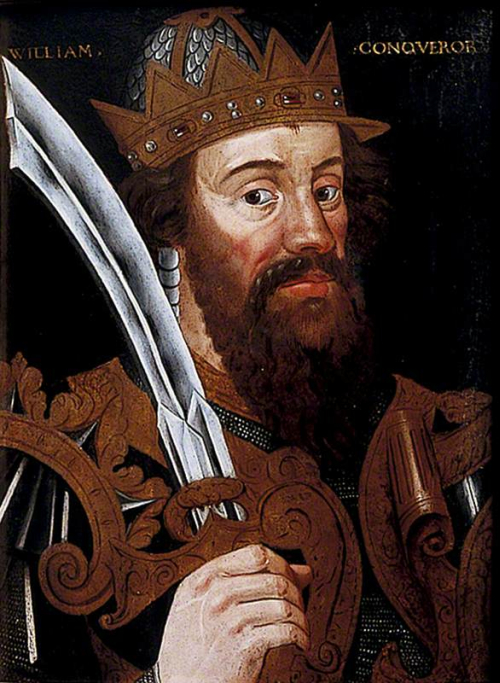 William the Conqueror, early on in his life was supported by his great-uncle, the Archbishop of Rouen, as well as the Capet king of France, Henry I. Unfortunately, the Archbishop died in 1037, plunging Normandy into chaos, as various factions fought to control the young Duc. Three of his guardians died in quick succession, and a major rebellion was underway in 1046. William seeked the aid of Henry I, and together they took Normandy back. William sat on his throne, and quickly went to work. He passed the Truce of God, an edict that forbade war on Sundays and Holy Days, and in churches and their grounds. He granted special permanent protection to the monks, clerics, women, children, pilgrims and merchants and farmers. That didn't convince all of his enemies, though, and he fought pretty much continuous war until 1054.  As William was consolidating power, Edward, King of England, named him his successor. However, Harold, an English Earl, was chosen to suceed Edward on his death by the nobles. At the same time, the King of Norway, Harald Hardrada had a claim for the throne through his nephew Magnus I. All in all, a three-way war was brewing. William has secured the blessing of the Pope Alexander II, as well as the Holy Roman Emperor Henry IV, and King Sweyn II of Denmark. William prepared his army for an invasion as Harold fought Harald at Stamford Bridge. Harald died there, as William landed and made his way north. William built a fort as his base of operations, ravaged the land, and waited for Harold to make a move. Eventually, Harold moved on Hastings, and William gave battle. Harold did not survive it, having been shot in the eye. The English refused to surrender, even with the death of their king. William sent forces to secure Kent, Dover, Canterbury and Winchester, caputring the royal treasury. Eventually, he marched on London, and the final bits of English resistance were quashed. He was crowned the King of England on Christmas Day, 1066.  For the rest of his life, he dealt with rebellions in England, as well as threats from Brittany on the French side. After his death, he left Normandy to his oldest son, Robert Curthose, and England to his second son, William Rufus. His third son, Henry, was left landless. The three fought over the territory for their entire lives, until, eventually, with the death of William, Henry became Henry I of England. Eventually, he fought and captured Robert as well, imprisoning him for life. Thus, Henry became the Duc of Normandy as well. His son, another loving William, died before Henry did, and his succession was in dispute. Eventually, after his death, England and Normandy fell into a period of civil war called The Anarchy. Normandy and England were lost to the House of Normandy, eventually falling into the hands of Stephen of Blois, William the Conqueror's daughter's son. We will end it here tonight, with the death of House of Normandy. TL;DR: Rollo's descendants feudalized Normandy, invaded England, and then pissed everything away. Built some bitchin' castles, though.
|
|
|
|
Film Update 8 - Roadtrip in a Coach Today's update dealt with holding onto power for dear life, and the changing of day-to-day life for a lot of people: the nobility needed to learn to get along with the king, the peasants needed to learn to follow the right faith, and the Bretons needed to learn to gently caress right off. loving event armies.  Anyway, today we're going to be talking about a much more recent movie than the other French ones we've been dealing with so far. So let's go back to the year 1791 in Ettore Scola's That Night in Varennes (La nuit de Varennes) (1982). Restif de la Bretonne, a writer, printer and pervert, helps a lady put a secret package on a coach leaving Paris. Soon, he commandeers a coach to follow it, certain that it's somehow connected to Louis the Sixteenth's flight from the capital. Along the way he encounters Giacomo Casanova and Thomas Paine, as well a nice cross-section of French society. The coaches try to follow the planned route of the King before he crosses the border, with some passengers eager to return him, and others trying to help.  This film is not as focused on its cinematography as the ones I usually end up recommending, but the social commentary's pretty great. We have the bourgeousie trying to be new aristocracy by bearing down on the pour, the aristos' naive adoration of the King and everything he stands for, and several flavours of revolutionary zeal. Underneath it all is a nice undercurrent of everything changing forever, and people's best years being behind them, whether real or imagined. The acting is pretty good, and the dialogue is very classy. If you enjoy roadtrip movies, French history or class struggles, I suggest you check out this film. It's pretty good.
|
|
|
|
Also, yeah, calling that vote. We're taking Koln and Koln alone.
|
|
|
|
Update 9 - The French Crusade Mme. de Beaumont wakes up in her hammock. The ceiling above her creaks as the rest of the caravan wanders on the deck, tying and untying knots, obeying the silent commands of the tall figure in a black cloak. Her fever is gone. Death no longer wants her. WIth a sigh, she gets up and heads upstairs. As she reaches the deck, she sees two shores on either side of them, in the distance. The coasts are littered with ports, each serving scores of ships made of silver and dreams. Ghost men dressing ghost ships. Another galley approaches them. This one, like the rest, is made of mist and hope. Her ghostly crew pile onto the deck to stare at M. Naturelle's ship. They jest and point at her, with terror in their ghost eyes, screaming with no sound. Except for one man. One man lies in the cabin. He is as real as any of the Caravan. He lies in his hammock, unable to move. His leg is blackened with gangrene, his eyes blood red. He sees the galley for what it is. The captain releases the wheel, and one of the Caravan takes his place at the helm. One blink, and M. Naturelle is on the other ship. He leans towards the man with gangrene and gently moves his hand over his eyes. Another blink, and he is back at the helm. The man with gangrene stands next to him, his leg healed. The Caravan grows. The ships pass each other, as ships often do. Soon the twin ports are behind them, and the figure looks at Mme. de Beaumont. The toll must be paid. The Baronne steadies herself, and spins her tale.   : Despite his ambitions getting the best of him, le Roi approached this war with far more prepaparation than the last. : Despite his ambitions getting the best of him, le Roi approached this war with far more prepaparation than the last.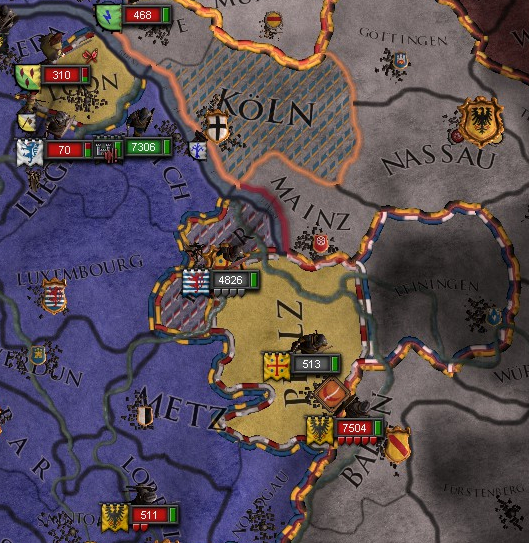  : His scouts saw the banners of the Great Catholic Coalition to the south. The kings of Middle Francia and Bavaria joined forces with the Germans to defend their Christendom. They were many. : His scouts saw the banners of the Great Catholic Coalition to the south. The kings of Middle Francia and Bavaria joined forces with the Germans to defend their Christendom. They were many.  : This time, he visited the Hebrew merchants of Rouen himself. He spoke to them of the new trade routes Cologne would open for the capital. He spun tales of the Catholic hatred for the Jews. He got his loan. : This time, he visited the Hebrew merchants of Rouen himself. He spoke to them of the new trade routes Cologne would open for the capital. He spun tales of the Catholic hatred for the Jews. He got his loan. : The French tresury was vast. Many men were eager to fight Creat's wars for some coin. : The French tresury was vast. Many men were eager to fight Creat's wars for some coin.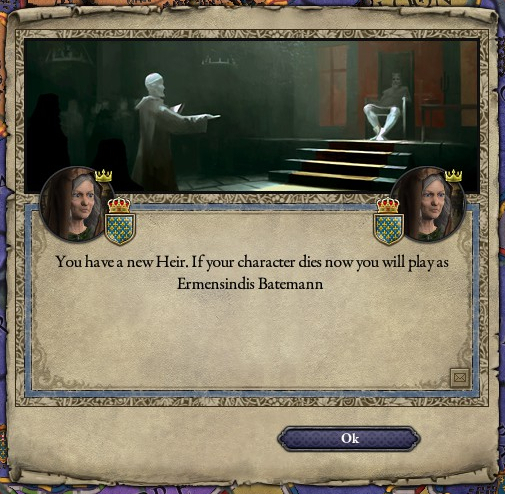  : Amidst all this, another elder Muslim with the right last name halfway across the world died. Ermensindis, le Roi's sister, and life-long rival, was now his heir. : Amidst all this, another elder Muslim with the right last name halfway across the world died. Ermensindis, le Roi's sister, and life-long rival, was now his heir.  : A few minor skirmishes on both sides prepared us for the greatest battle in French lands since Attila burnt their way through Gaul. Both sides took noble captives. : A few minor skirmishes on both sides prepared us for the greatest battle in French lands since Attila burnt their way through Gaul. Both sides took noble captives.  : And so, at dawn of Midsummer's day, the Grand Coalition clashed with the faithful. No Catholic walked away from the field that day. : And so, at dawn of Midsummer's day, the Grand Coalition clashed with the faithful. No Catholic walked away from the field that day.  : The Catholics were wrong about a great many things. They were wrong about the nature of Christ, they were wrong about the afterlife, and they were wrong about Satan. : The Catholics were wrong about a great many things. They were wrong about the nature of Christ, they were wrong about the afterlife, and they were wrong about Satan. : Yet, they were our brothers. We shared our stories with them, our past. They were lead astray by the Church, of course, but their stories were true. : Yet, they were our brothers. We shared our stories with them, our past. They were lead astray by the Church, of course, but their stories were true. : Creat told me that when they took Cologne, he order there to be no looting. He walked into the Grand Cathedral himself, and kneeled in front of the Shrine. : Creat told me that when they took Cologne, he order there to be no looting. He walked into the Grand Cathedral himself, and kneeled in front of the Shrine. : He prayed there. And there, he saw the likeness of the Three Magi. The three kings to praise Jesus Christ. Those that saw the spark of Michael in him. : He prayed there. And there, he saw the likeness of the Three Magi. The three kings to praise Jesus Christ. Those that saw the spark of Michael in him. : Even a king is humbled in the presense of ones so holy. : Even a king is humbled in the presense of ones so holy.  : It was decided that bishops have no place in the kingdom of the French. The church holds no power here. And so, le Roi granted the Duchy of Koln to his nephew, to rule as his vassal. : It was decided that bishops have no place in the kingdom of the French. The church holds no power here. And so, le Roi granted the Duchy of Koln to his nephew, to rule as his vassal.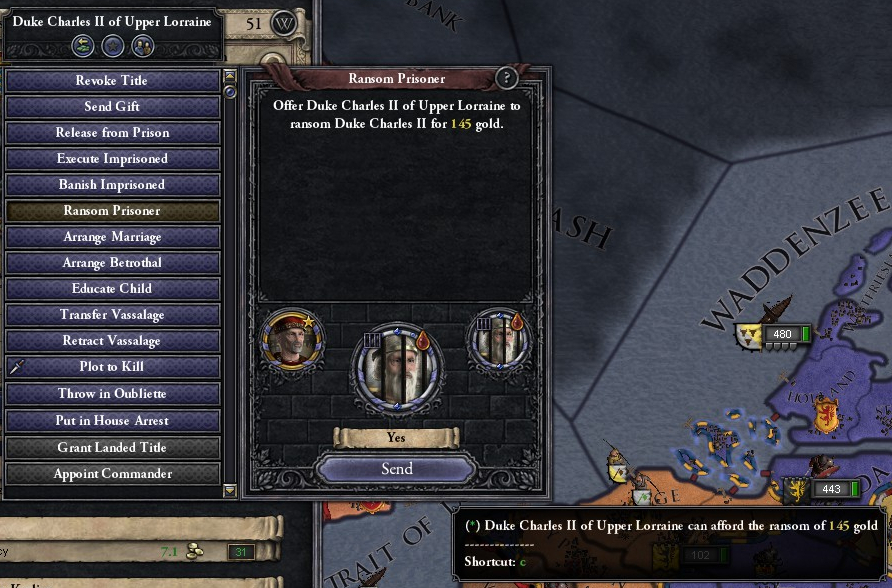  : Le Roi's brother, once his greatest ally in his bid for the throne, remained in the Rouen dungeons for five years. "A king cannot afford to be lenient to family. When you pay the ransom that the rest paid, then will you be free". After five years, Charles' wife brought enough gold to free her husband, and he went home. : Le Roi's brother, once his greatest ally in his bid for the throne, remained in the Rouen dungeons for five years. "A king cannot afford to be lenient to family. When you pay the ransom that the rest paid, then will you be free". After five years, Charles' wife brought enough gold to free her husband, and he went home.  : Ermensindis' husband, the inbred monster son born of an inbred monster, has finally passed away. He was not given any funeral rites, merely thrown into the Seine. She was to marry Creat's nephew. : Ermensindis' husband, the inbred monster son born of an inbred monster, has finally passed away. He was not given any funeral rites, merely thrown into the Seine. She was to marry Creat's nephew.  : With the war over, Creat sat in court as the final judge of the land yet again. But it was no longer the same. Something changed in him at Koln. : With the war over, Creat sat in court as the final judge of the land yet again. But it was no longer the same. Something changed in him at Koln.  : Nevertheless, as a King, he had a duty to his people. And so, he ordered the construction of another castle near Rouen. Fortification against the viking raiders, to protect the capital, under the King's domain. : Nevertheless, as a King, he had a duty to his people. And so, he ordered the construction of another castle near Rouen. Fortification against the viking raiders, to protect the capital, under the King's domain.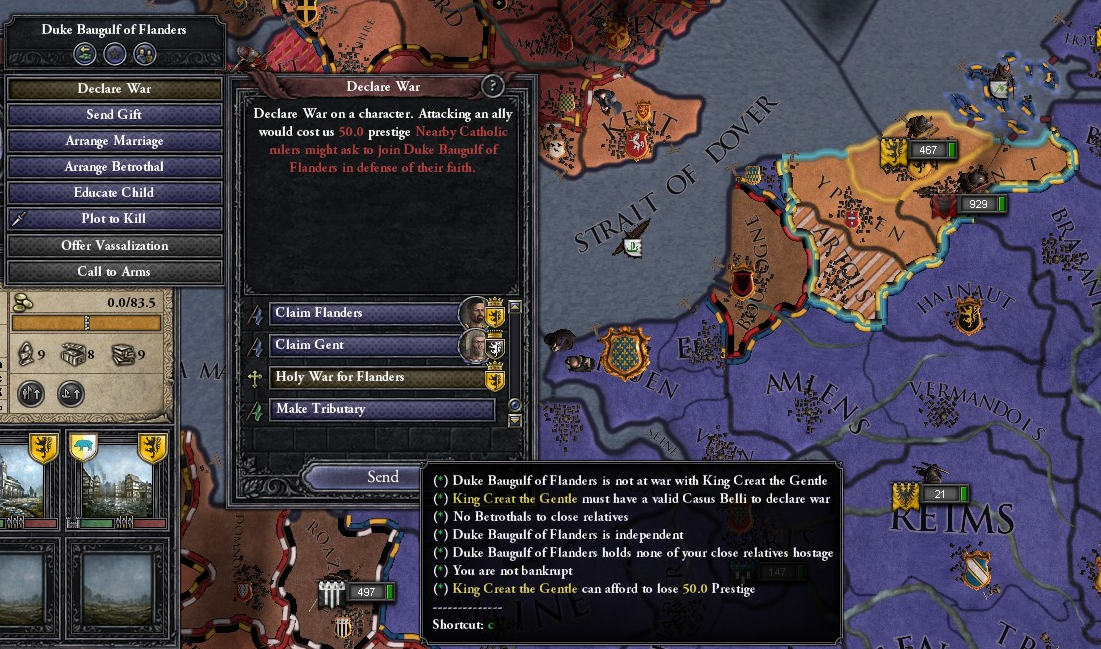  : Having had his fill of court, le Roi declared war on Flanders. It was too close to the capital, he said. Their missionaries have been poisoning the minds of our faithful for too long. : Having had his fill of court, le Roi declared war on Flanders. It was too close to the capital, he said. Their missionaries have been poisoning the minds of our faithful for too long.  : As he rode off to war, as he always did, he left me to help his wife inform him on court matters. My hatred for her had subsided. I still loved him, of course, but my emotions did not shine as bright anymore. I grew too old to keep the fires of hate burning. : As he rode off to war, as he always did, he left me to help his wife inform him on court matters. My hatred for her had subsided. I still loved him, of course, but my emotions did not shine as bright anymore. I grew too old to keep the fires of hate burning. : She was a clever girl, Romilda. She took to court well. Together, we wrote le Roi of the success of his castle. He named it Baronnie de Lillebonne, after a small village nearby. : She was a clever girl, Romilda. She took to court well. Together, we wrote le Roi of the success of his castle. He named it Baronnie de Lillebonne, after a small village nearby.  : Le Duc de Flanders was at war. His cousin claimed the duchy as his own. His men were of split loyalty, and could not stand the full might of the French army. : Le Duc de Flanders was at war. His cousin claimed the duchy as his own. His men were of split loyalty, and could not stand the full might of the French army.  : While the war in Flanders was progressing nicely, we've received a troubling missive. The Pope, as it turns out, had not taken the fall of Koln lightly. After much pleading from the German and Bavarian Kings, he had proclaimed a new era, an era of the Crusades. : While the war in Flanders was progressing nicely, we've received a troubling missive. The Pope, as it turns out, had not taken the fall of Koln lightly. After much pleading from the German and Bavarian Kings, he had proclaimed a new era, an era of the Crusades.  : Two orders of knights were formed. The German Catholics have banded together into the Orden der Bruder vom Deutschen Haus der Heiligen Maria, with the rest of the world calling them Teutons. : Two orders of knights were formed. The German Catholics have banded together into the Orden der Bruder vom Deutschen Haus der Heiligen Maria, with the rest of the world calling them Teutons.  : The Knights of the Order of St. John have long taken care of the sick in Jerusalem, taking the name Hospitallers. They too have heard the Pope's plea, and raised their arms for the corrupt Papacy. : The Knights of the Order of St. John have long taken care of the sick in Jerusalem, taking the name Hospitallers. They too have heard the Pope's plea, and raised their arms for the corrupt Papacy.  : Creat wrote to us to raise the defenses of the city. He knew what was coming, despite the many truces he had with the Germans. He wrote to us that Flanders had lost four thousand men that night, and would soon fall. : Creat wrote to us to raise the defenses of the city. He knew what was coming, despite the many truces he had with the Germans. He wrote to us that Flanders had lost four thousand men that night, and would soon fall.  : Soon, it did. The Duc and his cousin were sent to German courts as filthy papists should be. The army remained standing. : Soon, it did. The Duc and his cousin were sent to German courts as filthy papists should be. The army remained standing.  : Creat wrote us with instructions to reorganize the new territory and give it to another nephew. He was taking the army south. : Creat wrote us with instructions to reorganize the new territory and give it to another nephew. He was taking the army south.  : With le Roi out with the army, his movements hidden from the papists, it fell on Romilda to accept the formal declaration of war. The Papal Legate swore that heresy would be purged from the French lands. : With le Roi out with the army, his movements hidden from the papists, it fell on Romilda to accept the formal declaration of war. The Papal Legate swore that heresy would be purged from the French lands. : I counseled Romilda to hang the heretic here and now. She knew better. The Legate was told to run back to Rome. : I counseled Romilda to hang the heretic here and now. She knew better. The Legate was told to run back to Rome.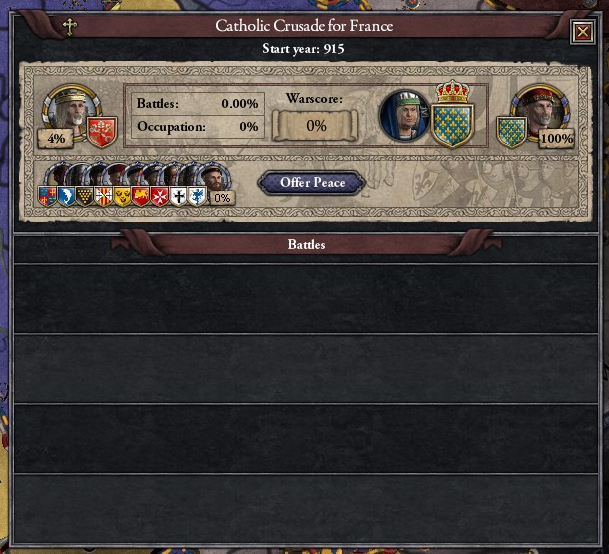  : Thankfully, Creat's truces saved us. The Kingdoms of Germany and Bavaria were the bulk of the Catholic strength in Europe. Having sworn before God to not take arms against the French for ten years, they could not take part in the crusade. We faced the English Kings, the Italian Dukes, and the Knights. : Thankfully, Creat's truces saved us. The Kingdoms of Germany and Bavaria were the bulk of the Catholic strength in Europe. Having sworn before God to not take arms against the French for ten years, they could not take part in the crusade. We faced the English Kings, the Italian Dukes, and the Knights.  : We had no news from Creat for months. I had worried that his grand army was not enough. That he had been swarmed by the papists in the night. : We had no news from Creat for months. I had worried that his grand army was not enough. That he had been swarmed by the papists in the night.  : I thought wrong. Creat marched much further south than I expected. Rather than defend our lands against the heretic, le Roi marched on the heart of the disease. : I thought wrong. Creat marched much further south than I expected. Rather than defend our lands against the heretic, le Roi marched on the heart of the disease. : His soldiers, men and women both, broke down the gates of Rome, and marched on Archbasilica of St. John Lateran. Its doors broken down, the old man was dragged out by Creat himself. He had assembled Rome's citizens, and showed them their Pope as nothing but the a tired, scared old man. His hair and beard were cut in front of the faithful, and his ceremonial robes burnt. : His soldiers, men and women both, broke down the gates of Rome, and marched on Archbasilica of St. John Lateran. Its doors broken down, the old man was dragged out by Creat himself. He had assembled Rome's citizens, and showed them their Pope as nothing but the a tired, scared old man. His hair and beard were cut in front of the faithful, and his ceremonial robes burnt.  : On his knees, the Bishop of Rome withdrew the Papal support of the French Crusade, and proclaimed that all those that raised a sword against the French in the Pope's name for thirty years were to be excommunicated. : On his knees, the Bishop of Rome withdrew the Papal support of the French Crusade, and proclaimed that all those that raised a sword against the French in the Pope's name for thirty years were to be excommunicated.  : But the Pope had opened Pandora's box. Travellers from the Byzantine Empire spoke of Sun Worshippers to the East. In response to the Pope's Crusades, they seemed to have started organizing their own. : But the Pope had opened Pandora's box. Travellers from the Byzantine Empire spoke of Sun Worshippers to the East. In response to the Pope's Crusades, they seemed to have started organizing their own.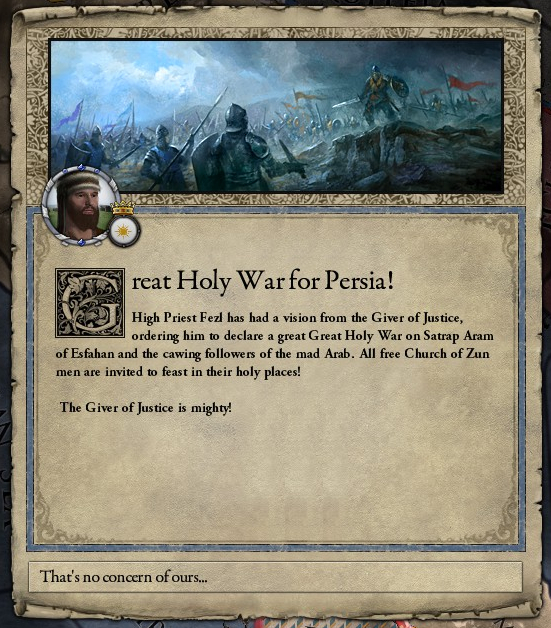  : The Persian Muslims have been in decline for centuries, with more and more kings and dukes declaring independence from the Caliph. The Church of Zun claimed their lands as its own. : The Persian Muslims have been in decline for centuries, with more and more kings and dukes declaring independence from the Caliph. The Church of Zun claimed their lands as its own.  : As Creat rode back with his army, he received our letter about a peasant revolt in Western France. Tired and angry, he and his troops marched on Poitiers. : As Creat rode back with his army, he received our letter about a peasant revolt in Western France. Tired and angry, he and his troops marched on Poitiers.  : I feel pity for the peasants. Farmers armed with scythes and hunger are no match for a French Knight charge. : I feel pity for the peasants. Farmers armed with scythes and hunger are no match for a French Knight charge.  : I hear Creat praised his knights, and spent long nights in his tent discussing strategy with them. He took to warfare far too naturally. : I hear Creat praised his knights, and spent long nights in his tent discussing strategy with them. He took to warfare far too naturally.  : After the peasants were cut down to a man, le Roi once again sat on his throne, listening to his people. The final arbiter of Justice in France. : After the peasants were cut down to a man, le Roi once again sat on his throne, listening to his people. The final arbiter of Justice in France.  : The court, as much as it drained him, made him a better ruler. His people felt protected, confident in his judgements. : The court, as much as it drained him, made him a better ruler. His people felt protected, confident in his judgements.  : With the fall of Koln and the failure of the French Crusade, the Catholics within our realm took kindly to our missionaries. More and more flocked to the Perfects for Consolamentum. : With the fall of Koln and the failure of the French Crusade, the Catholics within our realm took kindly to our missionaries. More and more flocked to the Perfects for Consolamentum.  : Another of Creat's family took her Consolamentum before her soul returned to the world. Ermensindis breathed her last breath. Le Roi stood vigil by his rival's deathbed. He hated her much as he loved her, I think. : Another of Creat's family took her Consolamentum before her soul returned to the world. Ermensindis breathed her last breath. Le Roi stood vigil by his rival's deathbed. He hated her much as he loved her, I think.      : His sister's death weighed hard on him. And so, he called for his own holy war. He claimed that the coast of Brittany, and the last Catholic fort in Flanders would hear of the Perfects by sword. : His sister's death weighed hard on him. And so, he called for his own holy war. He claimed that the coast of Brittany, and the last Catholic fort in Flanders would hear of the Perfects by sword.  : The English Kings that took part in the French Crusade had died, and their heirs wasted no time in proclaiming Creat to be the devil himself. They joined with the Kingdom of Eire in defending the Catholics in Brittany. : The English Kings that took part in the French Crusade had died, and their heirs wasted no time in proclaiming Creat to be the devil himself. They joined with the Kingdom of Eire in defending the Catholics in Brittany.  : Their troops were many. But not nearly many enough. Twenty leagues west of the capital, the Catholic League army stood against the French, and was cut down to a man. : Their troops were many. But not nearly many enough. Twenty leagues west of the capital, the Catholic League army stood against the French, and was cut down to a man.  : All of le Roi's anger, all of his grief poured out in that battle. He was no longer a man, but a wolf wearing the skin of the king. He tore through the Catholic armies like a whirlwind, making widows with each swing. He was St. George slaying the Dragon. He was Michael trampling Satan. He was the Wrath of God. : All of le Roi's anger, all of his grief poured out in that battle. He was no longer a man, but a wolf wearing the skin of the king. He tore through the Catholic armies like a whirlwind, making widows with each swing. He was St. George slaying the Dragon. He was Michael trampling Satan. He was the Wrath of God.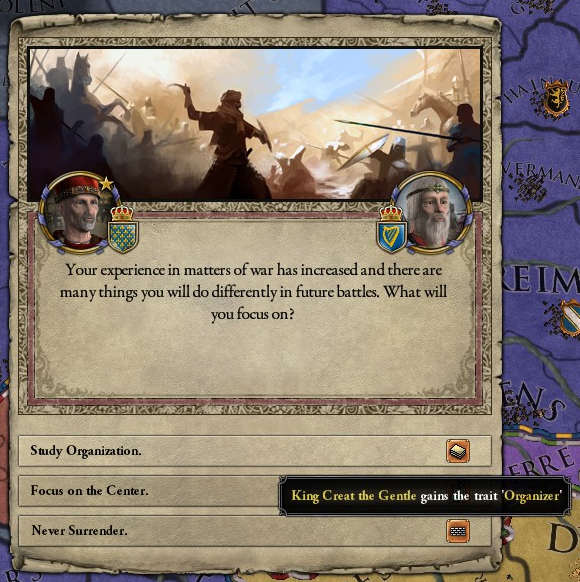  : His generals praised his fury, but moreover, his organization. With several of his suggestions, his armies marched fast, and reinforced the flanks much better. : His generals praised his fury, but moreover, his organization. With several of his suggestions, his armies marched fast, and reinforced the flanks much better.  : The battle of Caen scarred the Catholics. The Breton Comtes surrendered soon after. : The battle of Caen scarred the Catholics. The Breton Comtes surrendered soon after.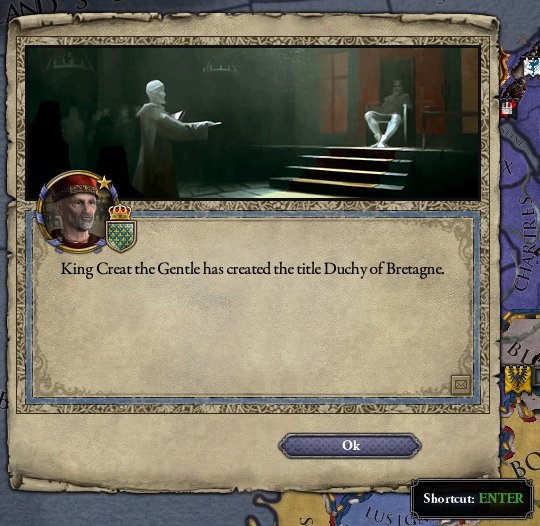  : On his return to the capital, he brought with him a recently-appointed mayor of Cornouaille, a small town on the coast of Brittany. He had, once again, created a duchy out of the newly-conquered lands. : On his return to the capital, he brought with him a recently-appointed mayor of Cornouaille, a small town on the coast of Brittany. He had, once again, created a duchy out of the newly-conquered lands.  : But he did not grant it to a nephew or a cousin. Instead, he named the mayor of Cornouaille the first Doge of the Bretagne. : But he did not grant it to a nephew or a cousin. Instead, he named the mayor of Cornouaille the first Doge of the Bretagne.  : The Breton lands were to be ruled as a trade republic, like Venice or Amalfi. They were to trade along the French coast with Muslims and Catholics, spreading word of the Perfects wherever they went. : The Breton lands were to be ruled as a trade republic, like Venice or Amalfi. They were to trade along the French coast with Muslims and Catholics, spreading word of the Perfects wherever they went.  : In return for this privilege, they were to pay a large share of their profits to the capital. This arrangement was deemed acceptable by the new Doge, who set off to the coast to supervise the building of new docks. : In return for this privilege, they were to pay a large share of their profits to the capital. This arrangement was deemed acceptable by the new Doge, who set off to the coast to supervise the building of new docks.  : Creat declared that he would be slowly withdrawing from court life. He was growing old, and wished to spend his twilight years in peace. : Creat declared that he would be slowly withdrawing from court life. He was growing old, and wished to spend his twilight years in peace.  : The court, of course, fought itself for le Roi's attention, retired or not. At every hunt, each spot in his retinue has a dozen men and women spying and backstabbing each other over it. His Marshall once secured his spot by bringing a wife of a courtier, a known Catholic who wished to debate le Roi on the finer points of theology. : The court, of course, fought itself for le Roi's attention, retired or not. At every hunt, each spot in his retinue has a dozen men and women spying and backstabbing each other over it. His Marshall once secured his spot by bringing a wife of a courtier, a known Catholic who wished to debate le Roi on the finer points of theology.  : Surprised by such bravado, le Roi entertained the woman in private. Passerbys claimed that they had certainly heard her mention God in his chambers. Loudly. : Surprised by such bravado, le Roi entertained the woman in private. Passerbys claimed that they had certainly heard her mention God in his chambers. Loudly.  : As le Roi withdrew further and further from the court life, his nephew had gathered an army against the German King. Nassau itself was in jeopardy. : As le Roi withdrew further and further from the court life, his nephew had gathered an army against the German King. Nassau itself was in jeopardy.  : Several of the Prince's cousins had joined him on this adventure. : Several of the Prince's cousins had joined him on this adventure.  : And it was no surprise. With Creat's sword defeating the papists at every turn for twenty years, Europe turned away from the Bishop of Rome. : And it was no surprise. With Creat's sword defeating the papists at every turn for twenty years, Europe turned away from the Bishop of Rome.   : In the East, rumours flew that Persia fell to the Sun Worshippers. : In the East, rumours flew that Persia fell to the Sun Worshippers.  : It had seemed that the Empire of the Sun was fighting back against Mohamettan invasion. : It had seemed that the Empire of the Sun was fighting back against Mohamettan invasion.  : Many new temples were constucted thoughout the empire. The Children of the Sun God spread far indeed. : Many new temples were constucted thoughout the empire. The Children of the Sun God spread far indeed.Mme. de Beaumont sits down on a nearby crate. She watches the coast. It is too far to see the ghost men working the ghost ships, but their lights continue to shine. They look so warm in the distance, so full of life. Somewhere out there, men fought each other over drink, and women called for their children. Somewhere out there, a girl fell in love for the first time, and her mother scolded her for it. Somewhere out there, boys took shallow breaths before jumping into the water after fish by the shore. But not here. Not at the Caravan. There was nothing here but the sound of the waves against the galley. She retires to her hammock. She still has a long road ahead of her.
|
|
|
|
History Update 9 - Relics and Pilgrimages Last time, we looked at the de Normandie dynasty, culminating in William the Conqueror's sons very quickly destroying themselves and the dynasty by infighting. Since this week we took a Catholic Holy site, I wanted to take a bit more of an in-depth look at what they are, and why they are deemed so important to Catholics. Assume most relic-related sentences contain the word "supposedly" somewhere, legends tend to vary a lot. Time to be slightly incorrect and step on a lot of people's toes. I apologize for any mistakes in advance. Hope y'all like pictures. According to the game, the five Catholic (and Cathar) holy sites are Koln in Germany, Canterbery in England, Santiago in Spain, Rome in Italy and Jerusalem in Israel, each of which had been a major Christian pilgrim destination. We'll be taking a look at them in this order.  Cologne Cathedral (Kolner Dom) is the current holder of the many treasures of Cologne. Work on the cathedral itself began in 1248, and it was worked on with various enthusiasm for the next 400 years, when it petered out. Eventually, in the 19th century, the construction was restarted under Prussian leadership using the medieval plans, and the cathedral was finally finished 1880. It only took 632 years.  But the cathedral itself is no the reason the city was picked to be a holy site in the game. No, the biggest holy draw in Cologne is the reliquary pictured above. The elaborate shrine itself was designed in the late twelf century and completed in 1225. The cathedral was built to contain the relic stored inside. The relic inside was brought from Milan by the Holy Roman Emperor after he became the King of Italy. It got into Milan by an oxcart in the fourth century by a bishop who took it from Constantinople. The original owners of the relics brought gifts of frankincense, myrrh and gold to a babe born in a manger outside Bethlehem. That's right, the Shrine of Three Kings is said to contain the bones of the Three Wise Men.   The cathedral also contains the Gero Crucifix, which is the oldest large crucifix north of the Alps, having been commissioned in 965; and the Milan Madonna, a statue of Mary with Jesus with unspecified magic powers.  The Cathedral and Metropolitical Church of Christ at Canterbury is one of the oldest churches in England, originally built in 597 and rebuilt in 1077. It is the current seat of the Archbisop of Canterbury, who happens to be the head of the Church of England. It houses the arm of St. Bartholomew. The cathedral was founded by St. Augustine of Canterbury, who was sent to England in 595 to spread the Word to the Anglo-Saxons. Augustine converted Aethelberht, the King of Kent to Christianity, and received his blessing to continue his missionary work.  Much later in 1170, Thomas Becket, the Archbishop of Canterbury, excommunicated the bishops of York, London and Salisbury after they crowned Henry the Young King. The Anarchy, as this period of, well, anarchy, was the time after the last son of William the Conqueror died without an heir. The clergymen fled to their king in Normandy, where they complained of Thomas' behavior. Henry proclaimed "What miserable drones and traitors have I nourished and brought up in my household, who let their lord be treated with such shameful contempt by a low-born cleric?", commonly rephrased as "Who will rid me of this turbulent priest?" Four knights took the hint, and butchered St. Thomas in the middle of the cathedral. Thomas was entombed in the cathedral, and the locals started seeing miracles around the tomb. Soon, the pilgrims begain regularly visiting the tomb.  According to legend, St. James the Great, one of Jesus' Apostles, brought Christianity to Spain. He preached Gospel in Iberia, but eventually returned to Judea, where was executed by Herod Agrippa. His body was then returned to Galicia by angels piloting a rudderless boat, while his head remained in Jerusalem. He was then properly buried in Compostela. His tomb was abandoned in the third century due to fear of persecution by the Roman authorities, and eventually rediscovered in 814. The King of Galicia and Asturias ordered a construction of a chapel, and then a church around the tomb. The church was burned in 997 by the army of the Caliph of Cordoba, but the tomb itself was left undisturbed. The current cathedral was built during 1075-1211.  As soon as the tomb was rediscovered, a large number of pilgrims started travelling to see the tomb of one of the Apostles. The Way of St. James (Camino de Santiago) became an official pilgrimage route, and traversing it would grant you a plenary indulgence, a cleansing of all sin. While the indulgences are long gone, the Way still gets its fair share of pilgrims to this day.  As the seat of the Bishop of Rome, and the occasional capital of the Christian Roman Empire, Rome remains a pretty common pilgrimage destination. The centuries of Papal rule drew a lot of donations from the faithful to Rome, both in gold and in holy relics. As a result, there has been a lot of religious development of the city. I'm not going to be able to cover it all, so we'll just take a brief tour.    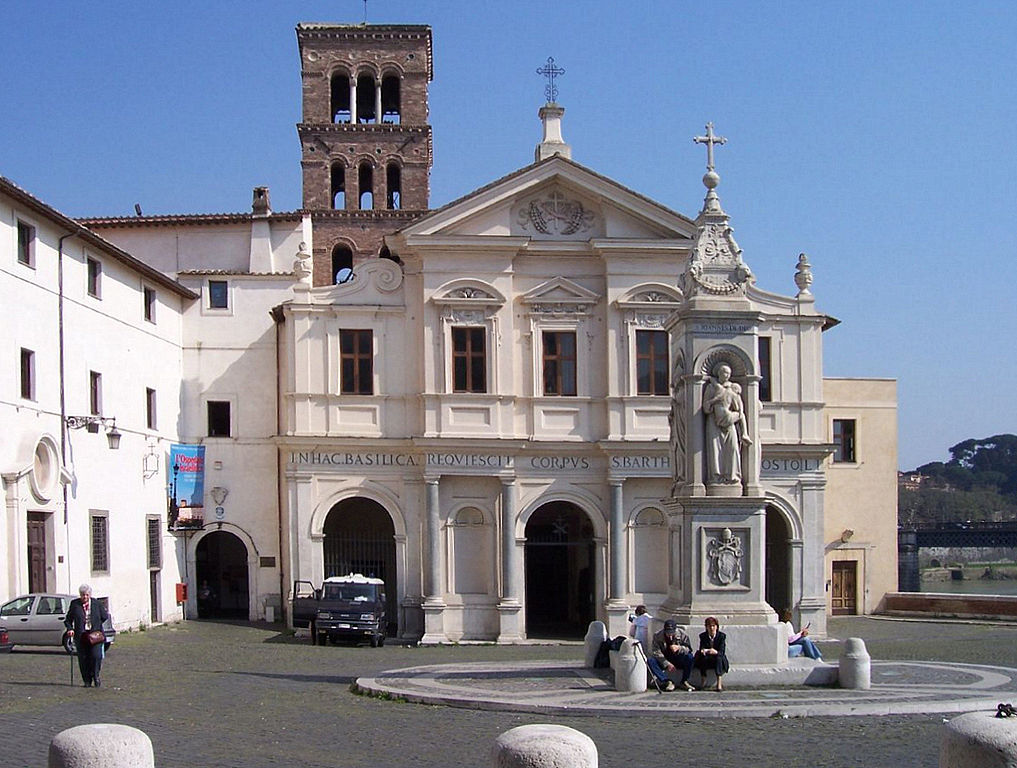 The remains of several of the Apostles are said to lie in Rome. Among them are St. Peter (beneath the altar of St. Peter's Basilica), St. Jude (a crypt in the same basilica), Simon the Zealot (again, same basilica), St. Paul (Basilica of St. Paul Outside the Walls), Phillip the Apostle (Santi Apostoli), James the Less (Santi Apostoli again) and Bartholomew the Apostle (San Bartolomeo all'Isola).   In addition to the two Basilicas mentioned above (St. Peter's and St. Paul's), Rome houses two more Major Basilicas: Basilica di Santa Maria Maggiorem which contains wood from the Holy Crib of the Nativity and the bones of St. Jerome, who translated the bible into Latin; and Archbasilica of St. John Lateran, the official seat of the Pope, which contains several Papal remains, and the Scala Sancta, marble steps that used to lead to the praetorium of Pontius Pilate and were sanctified by the steps of Jesus. 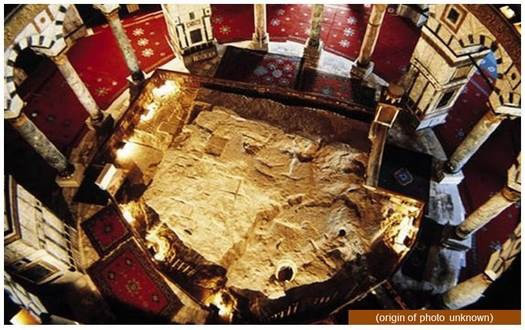 And, finally, we come to the Holy City itself, Jerusalem. In addition to the Christian holy sites we're going to talk about, it's also incredibly important to the Jewish tradition. It used to be the site of the Holiest of Holies, which, among other things, housed the Ark of the Covenant. The site where the Holiest of Holies used be is above the Foundation Stone, which is kind of important: And it was called the Foundation Stone because the world was founded on it. For Isaiah the prophet said, "Thus saith the Lord, 'Behold I lay in Zion a foundation for a stone...a costly corner-stone of sure foundation."' The Almighty, blessed be He, dropped a rock in the waters, and from thence the world expanded. The Almighty created the world in the same manner as a child is formed in its mother's womb. Just as a child begins to grow from its navel and then develops into its full form, so the world began from its central point and then developed in all direction. -Zev Vilnay, Legends of Jerusalem Also, beneath the Foundation Stone, there is a Well of Souls, where the souls of the dead sit, awaiting judgement day. The Stone is also important in the Muslim tradition: The Rock of the Temple is of the stones of the Garden of Eden. At resurrection day, the Kaaba Stone, which is in holy Mecca, will go to the Foundation Stone in holy Jerusalem, bringing with it the inhabitants of Mecca, and it shall become joined to the Foundation Stone, When the Foundation Stone shall see the Kaaba Stone approaching, it shall cry out, "Peace be to the great guest!" -Zev Vilnay, Legends of Jerusalem  The Foundation Stone is currently underneath the Dome of the Rock, the site of the miracles of Isra and Mi'raj, where the Prophet Muhammad (pbuh) prayed, and Gabriel tested him. He then ascended to heaven, spoke to previous prophets (such as Abraham, Moses, John the Baptist and Jesus), and God told him how Muslims are supposed to pray.  So yeah, an important place to a lot of people. Anyway, Christians. Probably the most important site there is the Church of the Holy Sepulchre. This is the site of Calvary, where Jesus was crucified. It also contains the tomb he was buried in and later ressurected from. The Rock of Golgotha (Calvary) is visible behind glass at the church. Beneath the rock, there is the Chapel of Adam, where Adam's skull was buried. Once again, really important.  Another pilgrimage site in Jerusalem is the Church of St. John the Baptist, built on a site where St. John the Baptist, who baptised Jesus, was born.  And the last one for today is the Church of All Nations, located on the Mount of Olives. This is where Jesus talked to the Apostles about the end times and their tribulations, where he prayed the night before his arrest, and where he finally ascended into heaven. That's enough of a tour for today. Join us next time, when we actually talk about Normans some more outside Henry the Young King. TL;DR: Five cities with a lot of religious history, including the remains of at least eight apostles. Kayten fucked around with this message at 17:13 on Sep 4, 2015 |
|
|
|
Sorry about the delay. Should have the Film update tomorrow. It's pretty late.
|
|
|
|
Kayten posted:It only took 6362 years.  Kayten posted:
I dig the LP by the way, it's really good stuff and a nice new take on CK2.
|
|
|
|
I'm really enjoying this LP's focus on "Look, these are actually terrible people."
|
|
|
|
DivineCoffeeBinge posted:I'm really enjoying this LP's focus on "Look, these are actually terrible people." It's nice that the guy named "The Gentle" has personally killed far more people than either of "The Cruel" kings we've had so far. sheep-dodger posted:That's a long-rear end project Oops, fixed the typo, thanks. You've actually travelled the Way? Do you have any stories or photos you could share? I'd be very interested. Kayten fucked around with this message at 16:37 on Sep 4, 2015 |
|
|
|
Yesss tank that Catholic MA. 
|
|
|
|
Film Update 9 - Saints and Sinners This week, we saw the profound effect faith has had on Creat. However, it didn't particularly turn him into a better person, just a different shade of rear end in a top hat.  With that in mind, we now return to 60s French cinema with Robert Bresson's 1966 Balthazar at Random (Au Hasard, Balthazar). A story of a donkey growing up in rural France, and a string of really lovely people that own him. Balthazar goes through life witnessing disjointed bits of people's stories, including Marie, his first owner. Life honestly really sucks for the poor donkey, as every new owner finds new ways to abuse him, as well as the people around him. He then dies. The end. 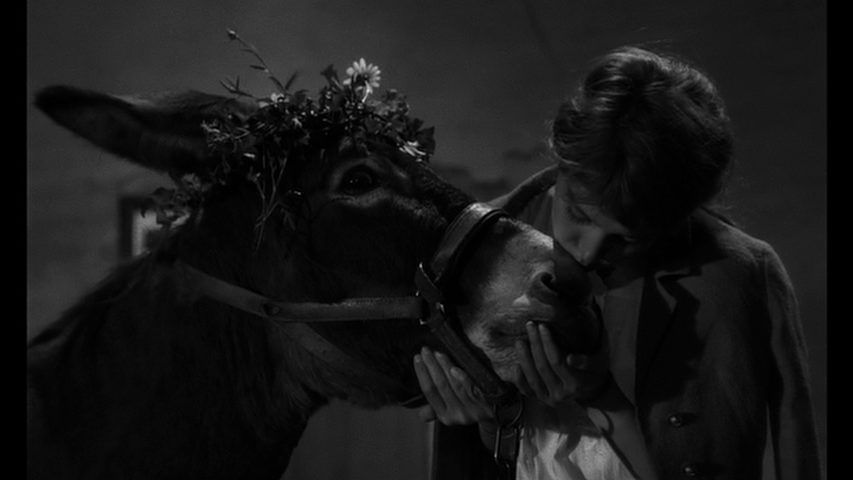 Bresson's films are a bit strange to watch. A firm believer in not letting his actors act, he wanted the scene to lack any small additions that the actors would try to bring. I'm gonna quote the late great Roger Ebert on this, since he's a lot better at writing words about movies than I ever could be: "[Bresson] was known to shoot the same shot 10, 20, even 50 times, until all "acting" was drained from it, and the actors were simply performing the physical actions and speaking the words. There was no room in his cinema for De Niro or Penn. It might seem that the result would be a movie filled with zombies, but quite the contrary: By simplifying performance to the action and the word without permitting inflection or style, Bresson achieves a kind of purity that makes his movies remarkably emotional. The actors portray lives without informing us how to feel about them; forced to decide for ourselves how to feel, forced to empathize, we often have stronger feelings than if the actors were feeling them for us." -Roger Ebert, Great Movie: Au Hasard, Balthazar  Whether or not this works is, of course, up to the individual to decide. I personally enjoyed it quite a bit, and found the distant performances helpful in separating the lovely people from the only decent character: Balthazar himself. He doesn't particularly try to do things, he knows his place in the world. He just is. Anyway, if you enjoy seeing some more experimental cinema, and also Catholic themes, I recommend giving it a try.
|
|
|
|
Alright, I finished playing until 969, now to write the actual updates. Here's a spoiler to tide you over: 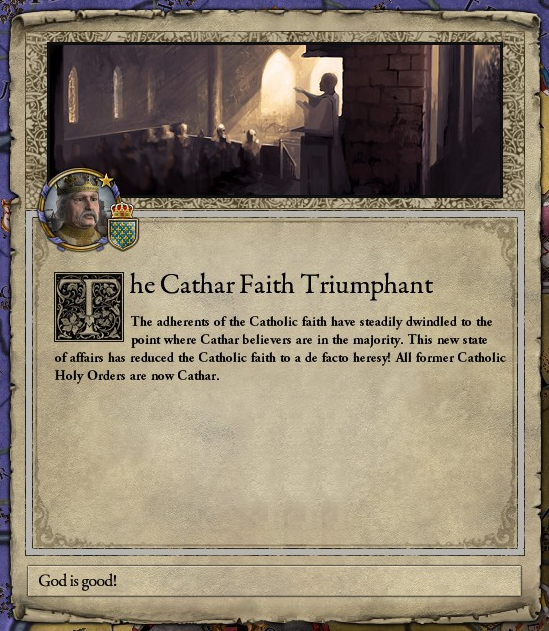
|
|
|
|
Great stuff. It's good to see the Zun going strong. I'll be following this one!
|
|
|
|
What (if anything) happens to the Pope if Catholicism gets turned into a heresy?
|
|
|
|
RabidWeasel posted:What (if anything) happens to the Pope if Catholicism gets turned into a heresy? He's still out there. With no land, he sits in the papal dimension.
|
|
|
|
Gently caress, Creat seems to be like if Alexander the Great was reborn and became a werewolf.
|
|
|
|
Sarcastical posted:Gently caress, Creat seems to be like if Alexander the Great was reborn and became a werewolf. you can swear you know.
|
|
|
|
Nice to see a mess of different religions in a campaign so far (and so early too!), can't wait to see how this shakes things up later.
|
|
|
|
Kayten posted:You've actually travelled the Way? Do you have any stories or photos you could share? I'd be very interested. Now, maybe the first thing to say is, that Saint James way is not only a pilgrimage route anymore. Sure, you'll find a lot of people doing it for religious reasons (I did for example talk to an old American lady in Pamplona who promised me she would include me in her prayers), but there are many people who are doing it for personal reasons, like the love of hiking, to take a different kind of vacation or to just get away from their day-to-day life and reevaluate what they are doing. For me it was mostly the latter, since I was struggling with depression at the time and wanted to take some time off to spend with myself and get a different perspective on what I had been doing so far, so that's the reason why I didn't take many pictures or did any of the more touristy stuff. (you can totally do all the tourist stuff along the way, as it goes through several large and beautiful cities, such as Leon or Burgos) Now, if you plan to do the Camino Santiago, the first thing you'll need is a credencial, which is basically an id for all the pilgrims which you need to be allowed to stay in the hostels along the way. You'll get that either in advance at your local Catholic church, or on-site in whichever town you start, there is only a nominal fee of 1 or 2 Euros on it. Those hostels (albergues in Spanish) are super common along the way. With one exception, where there are none on a 19km stretch, on average there will be at least one every 5 km, so the way is pretty easy today, since it is completely your own decision how far you want to push yourself any given day. You can do 5 km or you can do 40, depending on how you feel. The only restriction is that you don't stay at the same place twice, that is forbidden, unless you are ill. That is also one of the things your credencial is (at least supposedly) used for, as you collect stamps at each hostel where you stop, which show where you've been that day. There is even an entire culture around those stamps and some people collect them, since literally every single hostel, restaurant, bar or town along the way has their own stamp design. Staying at one these hostels costs usually something between 8 and 10 Euro, so it's pretty affordable. The way itself is very well marked, at literally every place where you could take a wrong turn you'll see a yellow sea-shell or a yellow arrow pointing you in the right direction. Over the 730 km I walked on the way, I took a wrong turn once and noticed within less than five minutes, so it's nearly impossible to really get lost. You'll still want to have some sort of map or guide though, to plan out how far you want to go the next days, so you can for example stock up if it looks like you'll only be going only through tiny villages that don't have a shop. (And there are quite a few of those along the way, the Spanish countryside has really been hit hard by people moving away and the demographic development of Europe) Depending on the season, you'll be meeting either a few, quite a few, or a metric fuckton of people along the way. (don't go in July in a year where July 25 is a sunday, as that is an especially holy year to do the camino and everybody and their dogs will be doing it) Nationalities, ages and genders are very mixed along the way, I was surprised for example to see the number of Korean pilgrims, but after a few days you'll notice that you keep seeing some faces again and again, especially at the hostels. Those are the people that go roughly the same distances each day as you, and it may be worthwhile to get to know them, since you will be seeing them quite often. While you can do the way as a group, generally you will walk alone for most of the time as the comfortable walking speeds are quite different between people, so you'll sometimes get to talking with another person, but usually one of you will go back to his comfortable pace after a while, meaning you split up again. Ok, this is getting pretty long now, I did not expect to write this many Maybe one last thing: while it may look daunting to see the length of the way, the fact that you can set your daily goals for yourself and go completely at your own pace, means that it'll only be as difficult as you want it to be, so personally I can recommend it to anyone who's interested.
|
|
|
|
sheep-dodger posted:cool santiago stuff That's really cool, thanks! Were most of the people that you managed to talk to on the pilgrimage there for religious reasons? Did you keep in touch with anyone you've met there? Did everyone speak Spanish? Are there any dishes in particular associated with the Way? I assume something with seashells. What's up with the sea-shells, by the way? Unrelated, I'm going to experiment a bit with the format, and post the game, history and film updates separately. We'll see how that plays out.
|
|
|
|
Update 10 - Nothing Beside Remains Mme. de Beaumont stands on the deck, watching distant shores passing by starboard. At port, an infinite sea, Oceanus come to life, stands still. In the distance, adhan is called and the people on the shore take out their prayer mats. This is the closest she's come to people in a while. She forgot how many there were. How much they struggled and yearned and just... lived. The captain appears next to her, pulling her out of her thoughts. It was easy to know when M. Naturelle was around - he wore silence like a cloak. She sighs, and spins her tale. 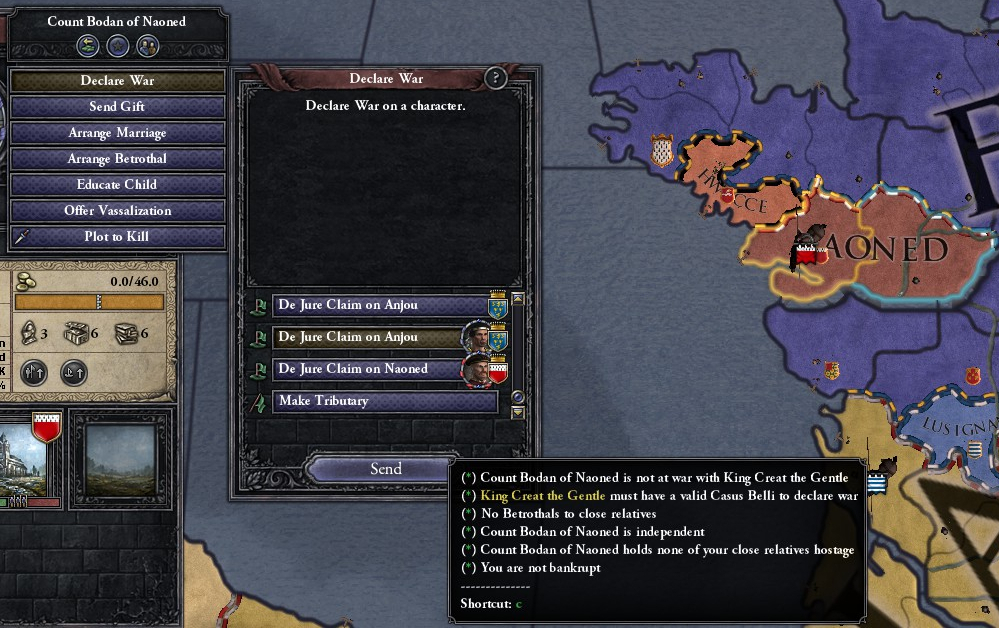  : The quiet life of hunting far from court did not take kindly to Creat. Le Roi tried to make peace with this, and to distract himself, went to war, as he always did. : The quiet life of hunting far from court did not take kindly to Creat. Le Roi tried to make peace with this, and to distract himself, went to war, as he always did.  : He was halfway to Nantes when he got my letter. Romilda was dead. Taken in the night. : He was halfway to Nantes when he got my letter. Romilda was dead. Taken in the night.She looks at the captain.  : But you know this already. : But you know this already.  : Romilda was an oddity. She wasn't a marriage of convenience for Creat. She made his day brighter. Gave him peace. Maybe that's why I stopped hating her. : Romilda was an oddity. She wasn't a marriage of convenience for Creat. She made his day brighter. Gave him peace. Maybe that's why I stopped hating her. : The new girl was a fine wife, don't get me wrong. Of noble blood, and a gentle creature. She just wasn't her. : The new girl was a fine wife, don't get me wrong. Of noble blood, and a gentle creature. She just wasn't her.  : She grew up listening to tales of the Roi Soleil, the Wolf King, a holy terror and a gentle knight. She wanted him to see her as worthy of his notice, the poor thing. Scoured Normandy for the finest pup she could as a wedding gift. : She grew up listening to tales of the Roi Soleil, the Wolf King, a holy terror and a gentle knight. She wanted him to see her as worthy of his notice, the poor thing. Scoured Normandy for the finest pup she could as a wedding gift.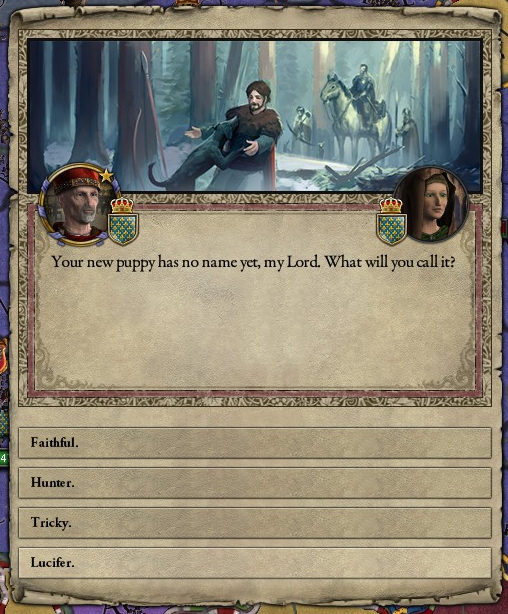  : I think he liked the dog more than the girl, to be honest. He took it with him to Nantes. He did not take her. : I think he liked the dog more than the girl, to be honest. He took it with him to Nantes. He did not take her.  : Le Roi was a natural on the battlefield. It made him forget everything else for a few hours. Just him and his fury against the heretic. : Le Roi was a natural on the battlefield. It made him forget everything else for a few hours. Just him and his fury against the heretic.  : But every battle ends. He pushed some noble's claim, and went back to the court he's grown to hate so much. : But every battle ends. He pushed some noble's claim, and went back to the court he's grown to hate so much.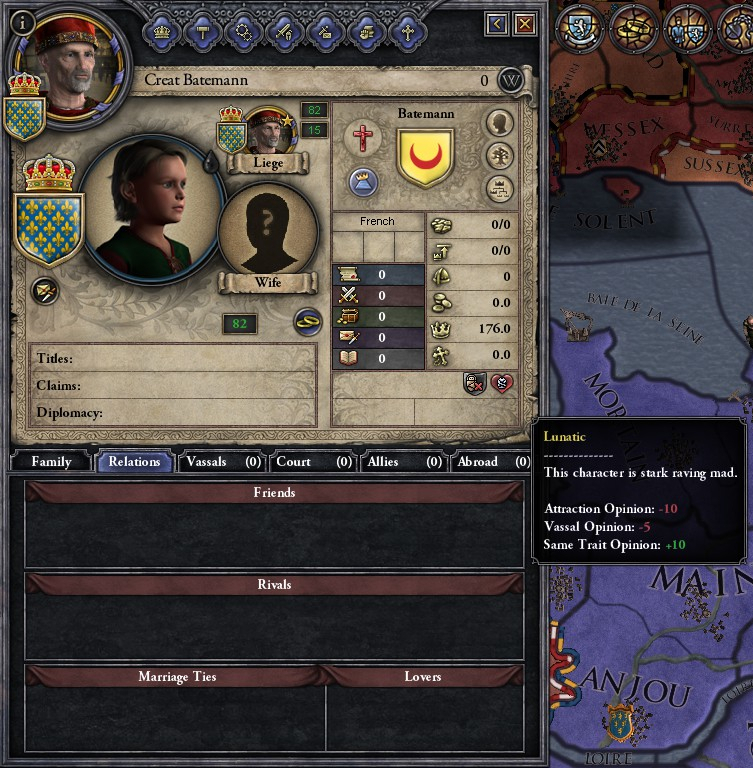  : He sat in arbitration as his niece's husband claimed she bore him a devil child. Claimed her cousin was the father. : He sat in arbitration as his niece's husband claimed she bore him a devil child. Claimed her cousin was the father. : To be fair, the babe snarled in court. Didn't cry, snarled. : To be fair, the babe snarled in court. Didn't cry, snarled. : He judged the babe a bastard and sent her to her husband's domain, across the Channel. The cousin remained here. : He judged the babe a bastard and sent her to her husband's domain, across the Channel. The cousin remained here.  : Creat brought many scholars from the monasteries in conquered lands. They were free to continue their work in the capital. Much of it bore fruit. : Creat brought many scholars from the monasteries in conquered lands. They were free to continue their work in the capital. Much of it bore fruit.  : He spent no time with his wife, and yet every day, he would run with Lucifer through the woods, training the beast. They grew close. : He spent no time with his wife, and yet every day, he would run with Lucifer through the woods, training the beast. They grew close.  : News came from the Low Countries of many more viking armies. Annoyed with the Scandinavian menace, le Roi raised a thousand knights, to keep the shores safe, who bore loyalty to none but the king. : News came from the Low Countries of many more viking armies. Annoyed with the Scandinavian menace, le Roi raised a thousand knights, to keep the shores safe, who bore loyalty to none but the king.  : As he was inspecting his recruits, more letters came. Charles, his once strongest ally, and a feared enemy, passed away. He dismissed his knights for the day, and rode to Nancy. He stood vigil for three days and three nights for his brother. : As he was inspecting his recruits, more letters came. Charles, his once strongest ally, and a feared enemy, passed away. He dismissed his knights for the day, and rode to Nancy. He stood vigil for three days and three nights for his brother.  : On the third night, he was visited by the Catholic woman he had debated with a few years prior. He left his vigil then. : On the third night, he was visited by the Catholic woman he had debated with a few years prior. He left his vigil then.  : She was found three days later, in the forest, her throat torn, bit by a great beast. Some assumed foul play, a pack of wolves sent after her by enemies. She was a Catholic. She had many. : She was found three days later, in the forest, her throat torn, bit by a great beast. Some assumed foul play, a pack of wolves sent after her by enemies. She was a Catholic. She had many.  : Creat returned to the court. His new wife threw a great feast, in memory of Charles. The feast went poorly. : Creat returned to the court. His new wife threw a great feast, in memory of Charles. The feast went poorly.  : Dismissing his wife, but bearing her no ill will, he assembled the noble estate, and demanded they conduct a count of families under their domain and report it to Rouen. From then on, le Roi was the last arbiter of taxes. : Dismissing his wife, but bearing her no ill will, he assembled the noble estate, and demanded they conduct a count of families under their domain and report it to Rouen. From then on, le Roi was the last arbiter of taxes.  : His wounds had healed by then, and he looked fearsome. With Lucifer at his side, he made his proclamation, and the nobles tripped over themselves to sign their pledges. : His wounds had healed by then, and he looked fearsome. With Lucifer at his side, he made his proclamation, and the nobles tripped over themselves to sign their pledges.  : He had noticed that one of his Ducs had an interesting prisoner. Arnold of Germany himself was passing his days in the Duc's dungeon. Creat saw an opportunity and paid him a visit. : He had noticed that one of his Ducs had an interesting prisoner. Arnold of Germany himself was passing his days in the Duc's dungeon. Creat saw an opportunity and paid him a visit.  : The visit was brief, but productive. The German King agreed to no longer claim any lands west of the Rheine as his own. : The visit was brief, but productive. The German King agreed to no longer claim any lands west of the Rheine as his own.   : While he was speaking to the man, he also demanded the German surrendered his claim over Thuringia, since no German nobles remained in the Duchy. Arnold was most cooperative. : While he was speaking to the man, he also demanded the German surrendered his claim over Thuringia, since no German nobles remained in the Duchy. Arnold was most cooperative.  : Le Roi's wife, concerned with her husband's behaviour, brought over an old priest to speak with him. The man was exiled from Normandy the minute he opened his mouth about "during" Creat. : Le Roi's wife, concerned with her husband's behaviour, brought over an old priest to speak with him. The man was exiled from Normandy the minute he opened his mouth about "during" Creat.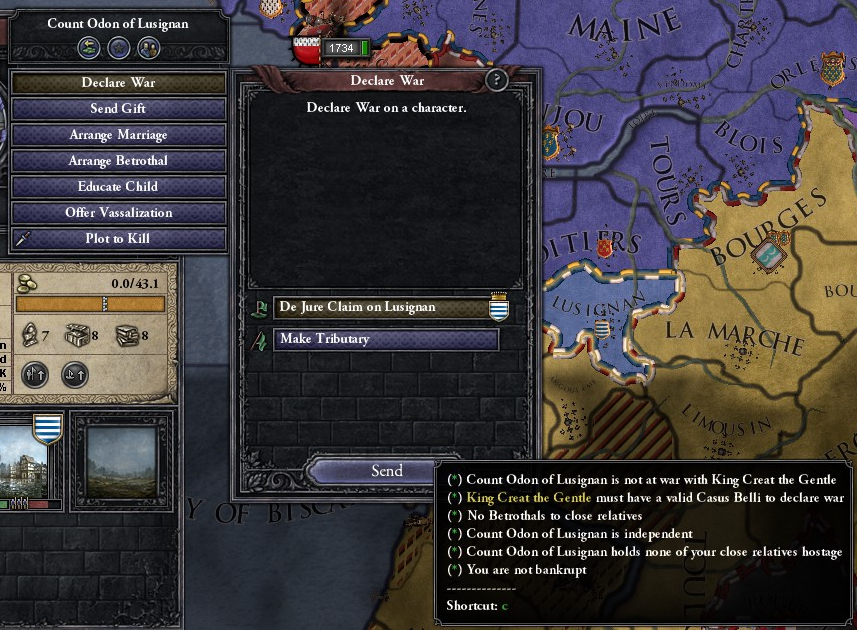  : Only one easy target remained on the horizon. The Lollard heretics remained in Lusignan for generations, and spread their dangerous heresies near our lands. Creat had gathered his Thousand, and went south, assembling his Ducs' troops along the way. : Only one easy target remained on the horizon. The Lollard heretics remained in Lusignan for generations, and spread their dangerous heresies near our lands. Creat had gathered his Thousand, and went south, assembling his Ducs' troops along the way.  : His rage was no longer contained to the battlefield. : His rage was no longer contained to the battlefield.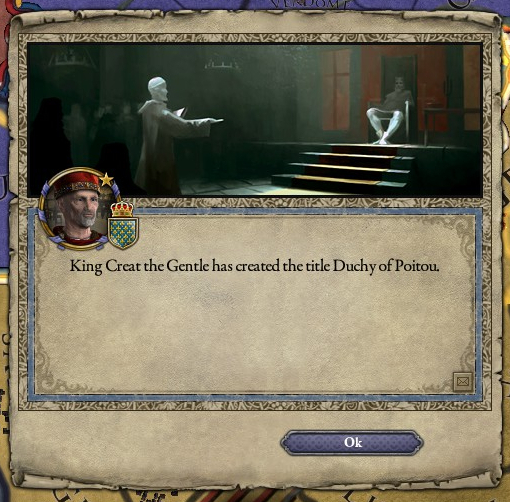  : The Lollards couldn't stand against his rage. He reorganized the land into another Duchy, and another distant cousin was given claim. : The Lollards couldn't stand against his rage. He reorganized the land into another Duchy, and another distant cousin was given claim.  : It did not ease the burden on his heart. : It did not ease the burden on his heart.  : He no longer wore his family's colours at court, or on the battlefield. He ate with his troops. : He no longer wore his family's colours at court, or on the battlefield. He ate with his troops. 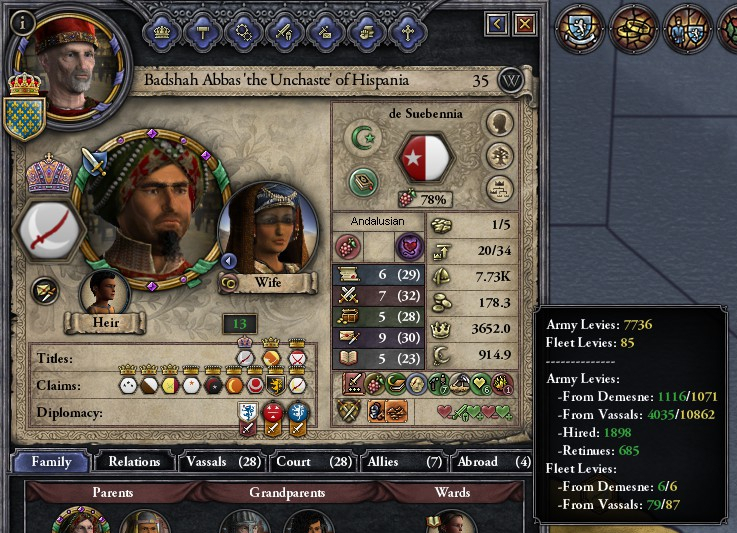  : And in the mess, he heard rumours of trouble in Hispania. The Badshah was protecting some minor county from the Catholics, and had lost half his men in the Alps. : And in the mess, he heard rumours of trouble in Hispania. The Badshah was protecting some minor county from the Catholics, and had lost half his men in the Alps.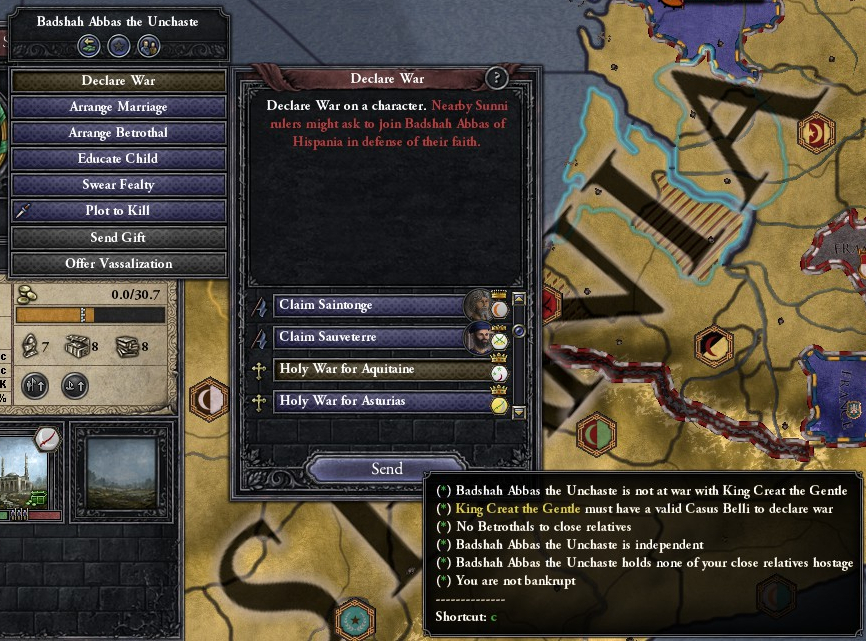  : Creat simply got up, saddled his horse, and rode south with Lucifer. The men followed, and with them, the nobles. Soon there were fifteen thousand faithful in Aquitane. : Creat simply got up, saddled his horse, and rode south with Lucifer. The men followed, and with them, the nobles. Soon there were fifteen thousand faithful in Aquitane.  : I wrote him another letter. His Muslim cousin was dead. His new heir was Ermessinde, a Catholic sitting in the house that was the remains of Middle Francia. He did not write back. : I wrote him another letter. His Muslim cousin was dead. His new heir was Ermessinde, a Catholic sitting in the house that was the remains of Middle Francia. He did not write back.  : The faithful beat back the exhausted Muslims and took Aquitane. This was the first major victory against the Hispanians in an age. Creat was hailed a hero to Christendom. He gave no speeches. : The faithful beat back the exhausted Muslims and took Aquitane. This was the first major victory against the Hispanians in an age. Creat was hailed a hero to Christendom. He gave no speeches.  : Aquitane was once again in Christian hands. Creat ran out of cousins, and started giving lands to nephews. : Aquitane was once again in Christian hands. Creat ran out of cousins, and started giving lands to nephews.  : Assembling the noble estates once more, with Lucifer by his side, he gave another proclamation. Any crimes that threatened the realm, such as heresy, usury or conspiracy were now to be tried in the capital. How could the nobles say no to the first man to hurt the Muslims since Charlemagne? : Assembling the noble estates once more, with Lucifer by his side, he gave another proclamation. Any crimes that threatened the realm, such as heresy, usury or conspiracy were now to be tried in the capital. How could the nobles say no to the first man to hurt the Muslims since Charlemagne?  : Creat's new wife remained as obsessed with his well-being as ever. She found a noblewoman well-known in the carnal arts, and gently introduced them. Creat recognized his grand-niece, and sent her away. He never spoke to his Reine again. : Creat's new wife remained as obsessed with his well-being as ever. She found a noblewoman well-known in the carnal arts, and gently introduced them. Creat recognized his grand-niece, and sent her away. He never spoke to his Reine again.  : News from the Vreton coast soon came. A viking raider slew the Comte de Nantes, and proclaimed himself the new ruler of Brittany. : News from the Vreton coast soon came. A viking raider slew the Comte de Nantes, and proclaimed himself the new ruler of Brittany.  : This would not do. : This would not do.  : The vikings were fierce. But so was Creat. : The vikings were fierce. But so was Creat.  : They were thrown back into the sea. All of Bretagne was ours. : They were thrown back into the sea. All of Bretagne was ours. : Create returned, and looked for joy in the only way he knew how - hunting with Lucifer. He took a small retinue, and went into the woods in search of boar. : Create returned, and looked for joy in the only way he knew how - hunting with Lucifer. He took a small retinue, and went into the woods in search of boar. : A minor count's son aimed poorly. : A minor count's son aimed poorly.  : In his rage, Creat beheaded the boy in one swing. The father knew his place. He said nothing. : In his rage, Creat beheaded the boy in one swing. The father knew his place. He said nothing. : Creat demanded that a great pyramid was to be built on that spot. High enough to be seen from the walls in Rouen. : Creat demanded that a great pyramid was to be built on that spot. High enough to be seen from the walls in Rouen.  : He was arguing with an architect over its height, when his face went pale, and he fell. He could not even call for a Perfect. He received no Consolamentum. : He was arguing with an architect over its height, when his face went pale, and he fell. He could not even call for a Perfect. He received no Consolamentum.Mme. de Beaumont looks back to the shore.  : He may wander there still. I do not know. I had no seen him. : He may wander there still. I do not know. I had no seen him. : His wife's last act was to declare a month of mourning across the realm. : His wife's last act was to declare a month of mourning across the realm.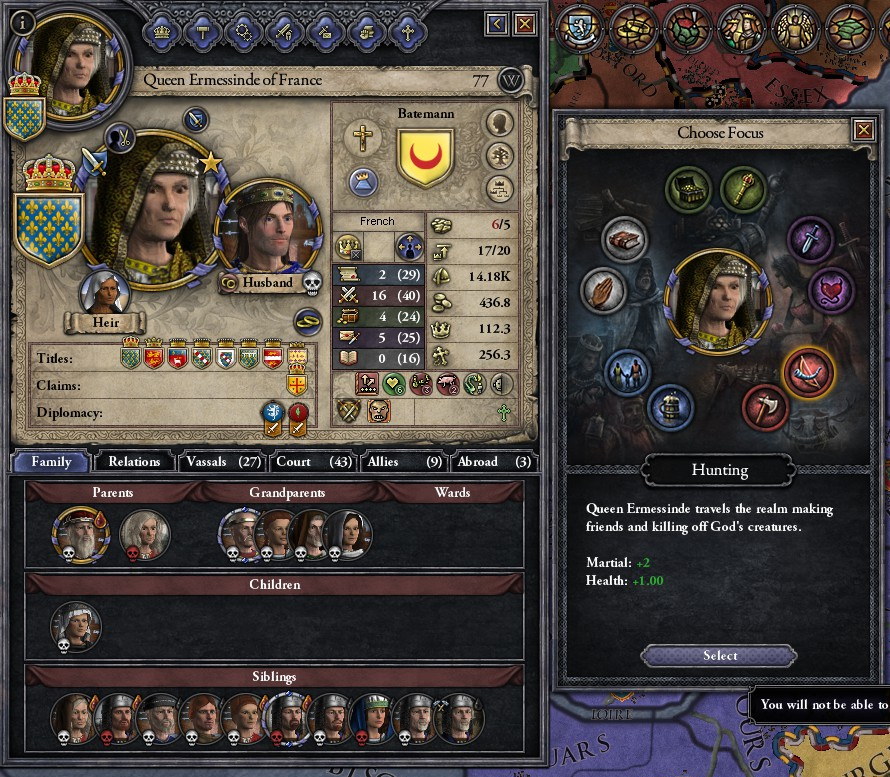  : Ermessinde was a quiet woman. She insisted on a small coronation. : Ermessinde was a quiet woman. She insisted on a small coronation.  : In front of the nobles of France, she abandoned her papist ways, and took Consolamentum. They praised her as Ermessinde la Premiere, Reine des Francais. : In front of the nobles of France, she abandoned her papist ways, and took Consolamentum. They praised her as Ermessinde la Premiere, Reine des Francais.  : With the noble estates assembled at court for the coronation, she proclaimed the Muslim and Papist threat to be too great to be left to the Ducs. She proposed each Duc gave three of five men to the crown, and sent their firstborn to Rouen to be properly educated. : With the noble estates assembled at court for the coronation, she proclaimed the Muslim and Papist threat to be too great to be left to the Ducs. She proposed each Duc gave three of five men to the crown, and sent their firstborn to Rouen to be properly educated.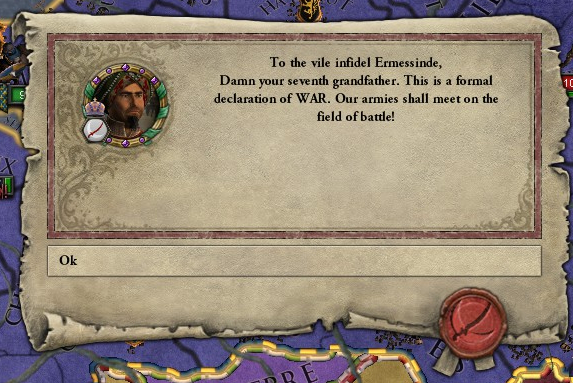  : In the middle of her speech to the estate, a runner burst in. War, he said. War with Hispania. : In the middle of her speech to the estate, a runner burst in. War, he said. War with Hispania.  : La Reine demanded an answer from her nobles. Practically at swordpoint, each one signed her treaty. The crown grew stronger : La Reine demanded an answer from her nobles. Practically at swordpoint, each one signed her treaty. The crown grew stronger  : She had no time to settle affairs of succession, and simply proclaimed the oldest living Batemann Cathar to take the throne should she not return. : She had no time to settle affairs of succession, and simply proclaimed the oldest living Batemann Cathar to take the throne should she not return. : Like Creat, she saddled her horse, and rode to meet the Muslims in Aquitane. : Like Creat, she saddled her horse, and rode to meet the Muslims in Aquitane.  : Like Creat, she charged in with the cavalry. Like Creat, she broke the heathens. : Like Creat, she charged in with the cavalry. Like Creat, she broke the heathens.  : Like Creat, she commanded her knights with zeal. : Like Creat, she commanded her knights with zeal.  : And like Creat, she fell soon after. : And like Creat, she fell soon after.  : Berald, her heir, was the ugliest man I've ever seen, yet a man who knew his responsibilities. He postponed his coronation, and rode to finish Ermessinde's war. : Berald, her heir, was the ugliest man I've ever seen, yet a man who knew his responsibilities. He postponed his coronation, and rode to finish Ermessinde's war.  : The Muslim army was broken, and Berald rode straight to Santillana del Mar, the Hispanic capital, and seiged the palace. He took the Badshah's wives, and his sons prisoner. : The Muslim army was broken, and Berald rode straight to Santillana del Mar, the Hispanic capital, and seiged the palace. He took the Badshah's wives, and his sons prisoner.  : He had no choice but to surrender. Aquitane would remain French. : He had no choice but to surrender. Aquitane would remain French.  : Berald returned to Rouen, and insisted on organizing the coronation himself. Said it relaxed him. : Berald returned to Rouen, and insisted on organizing the coronation himself. Said it relaxed him.  : Eager to prove himself as able a hunter as Creat, he took to the woods to capture a boar for the feast after the coronation himself. : Eager to prove himself as able a hunter as Creat, he took to the woods to capture a boar for the feast after the coronation himself.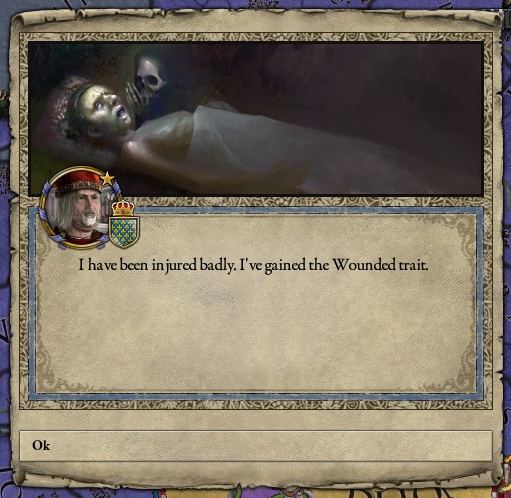  : He was nothing like Creat. : He was nothing like Creat.  : Yet, he swore the oaths, and said the words. He was proclaimed Berald le Premier, Roi des Francais. : Yet, he swore the oaths, and said the words. He was proclaimed Berald le Premier, Roi des Francais. : But a loose conglomeration of Ducs, led by the Doge of Bretagne remained seated during this proclamation. They demanded recognition of their God-given rights over their Duchies. They called for the repeal of Ermessinde's Law. They refused to see Berald as their king otherwise. : But a loose conglomeration of Ducs, led by the Doge of Bretagne remained seated during this proclamation. They demanded recognition of their God-given rights over their Duchies. They called for the repeal of Ermessinde's Law. They refused to see Berald as their king otherwise.  : So yet again, France fell into civil war. : So yet again, France fell into civil war.Mme. de Beaumont looks into the distance once again. She is done playing the chronicler for the day. On the shore, the time for prayer has ended. The port town goes about its business. The living continue living. The dead sail on.
|
|
|
|
Kayten posted:Were most of the people that you managed to talk to on the pilgrimage there for religious reasons? Kayten posted:Did you keep in touch with anyone you've met there? Actually yes, on the very first day I met a woman from Flanders, with whom I walked for about three days (from Pamplona to Logrono), since we were going at pretty much the exact same speed. I've been keeping in loose contact with her over the past year. She's a blast to talk to, as she speaks half a dozen languages, and provided me with an friendly ear to tell about my insecurities and fears. (In the super remote chance she reads this: Hi Lieve!) Kayten posted:Did everyone speak Spanish? first course: either some salad or pasta second course: some meat with some potato product, i.e. French fries dessert: creme catalana, fruits, yoghurt Protip: Take the pasta for the first course, I at least was always pretty starved after walking ~30km and even though I had had two other meals over the course of the day, I could always finish two full main courses (the pasta essentially is a main course in itself) Kayten posted:Are there any dishes in particular associated with the Way? I assume something with seashells. Kayten posted:What's up with the sea-shells, by the way?
|
|
|
|
History Update 10 - Anarchy in the UK Last week, we took a small detour from our study of Norman dukes to look at some Catholic pilgrimage sites (big thanks to sheep-dodger for his words on the Way of Santiago). We now return to our regularly scheduled gently caress-ups, as we discuss The Anarchy. Heads up, we're gonna run into some name confusion here, since apparently everyone associated with this clusterfuck knew only three names. I'll try to keep it as clear as possible. Dramatis Personae (The gently caress-Ups): William the Conqueror, King of England (1066-1087) -Henry I of England, his son, King of England (1100-1135) ---William Adelin, his son, drowned ---Robert of Gloucester, his bastard son ---Matilda of England, his daughter -----Henry FitzEmpress of England, her son with Geoffrey, King of England (1154-1189) -Adela of Normandy, his daughter ---Stephen de Blois, her son, King of England (1135-1154) ---Henry of Winchester, her son, Bishop of Winchester Henry V, Matilda of England's husband, Holy Roman Emperor (1111-1125) Geoffrey of Anjou, Matilda of England's husband, Count of Anjou (1129-1151) David I of Scotland, Matilda of England's uncle, King of Scotland (1124-1153) ---Henry of Scotland, his son and heir to the Kingdom of Scotland Miles of Gloucester, an English noble, declared for Matilda Ranulf of Chester, an English noble, declared for Matilda, then Stephen, then Henry  The White Ship, or the death of William Adelin, the last hope of the de Normandie dynasty We left off with Henry I, and his son William. William has spent time with his father in Normandy, before they all decided to head back. Taking a ride on a ship captained by a son of one of William the Conqueror's captains, William drowned when the ship wrecked. This caused a major problem, since Henry had no other sons to pass on the Kingdom (and duchy) to. Henry tried to pass the crown to his daughter, Matilda, which did not go over well. Matilda was married to Henry V, the future Holy Roman Emperor, which helped prolong this whole charade. She was crowned in Rome as the Empress consort to Henry V when he ascended to the throne. She remained behind in Italy to act as his Imperial Regent. Later, after Henry V passed away, she was married to Geoffrey of Anjou.  Stephen de Blois, King of England, fuckup extraordinaire Shortly after Henry's death in 1135, William the Conqueror's daughter's son, Stephen, took the throne. His coup was greatly helped by Henry (of Winchester, son of Stephen Henry), his younger brother. Henry (of Winchester) previously supported Matilda's bid for the throne, but eventually claimed that order in the kingdom was more important than his older vows. So, Matilda got screwed out of her crown. Stephen was a really lovely king. He had to fight a Scottish invasion as soon as he got on the throne, followed by a rebellion in Wales. Neither one really went his way, with the Scottish peace favouring the Scots, and the Welsh rebellion burning bright as Stephen abandoned it to concentrate his forces on other matters. He quashed two rebellions in the south, while Normandy was under attack by Geoffrey, Count of Anjou. While eventually fighting against Geoffrey, Stephen managed to gently caress up enough to have his army fight itself: the mercenaries and the local barons weren't on very good terms. Stephen peaced out with Geoffrey by paying him a lot of money to just leave him alone, please, he was dealing with a lot.  Empress Matilda of the Holy Roman Empire, claimant to the English throne, not too bright This sign of weakness prompted Matilda's half-brother, Robert, Earl of Gloucester, told the king to shove it, and declared for Matilda. This worked out really well for everyone, since David, King of Scotland, immediately declared war again, as did Geoffrey. David claimed to be supporting Matilda as well. The combined invasion didn't exactly go as planned, and the Scots were pushed back. The Scots expected Robert's troops to reinforce them, but Robert remained in Normandy, trying to persuade Matilda to invade personally. Stephen peaced out with the Scots, granting them some of the lands seized in the north, and set out dealing with Geoffrey. He had created a ton of new earldom, and granted them to good generals. On a roll with this whole leadership thing, he declared that a number of bishops deemed a threat to the crown could not hold any more castles, and were to surrender them to the crown. This went over swimmingly with many people, especially his brother Henry, himself a bishop who saw an alarming trend. After an unsuccessful appeal to Rome, a siege, and a threat to execute a family member, the bishops relented and surrendered their castles. Casual reminder, the Welsh rebellion never actually stopped at this point.  Blue is territory held by Matilda's forces, red is Stephen's, and gray is Welsh In 1139, Matilda finally invaded the south of England, and took the castle of Arundel. Her brother, Robert, went to Bristol with his army in order to get support of the locals. Stephen saw Matilda undefended, and sieged the castle. He had her right where he wanted her. And then, in his infinite wisdom, he sent his brother to negotiate a truce with her, letting her go to Robert to link up with the army. Again, lovely king. He took his forces west to try to deal with Robert and his army. However, Robert's preaching took hold, and one of his converts, Miles of Gloucester, took his army all the way to London. Stephen was forced to abandon the west and head back east. He quickly took care of a minor rebellion by a pissed-off bishop, and turned his gaze north. In the north, Ranulf of Chester was a nuisance to Stephen. His lands were granted to Scotland after the latest invasion, and he was not happy about this. Large swaths of land were granted to Henry of Scotland, David's son. He's had enough of this, and planned to ambush the prince while he was in England. Stephen has heard of the plot, and sent him north with an escort. In response, Ranulf took the castle of Lincoln. Worried that he might switch over to Matilda's side, Stephen made a pact with Ranulf to just stay out of each other's way. However, he had soon learned that Lincoln was very lightly defended, and in his infinite wisdom, he marched on the castle. Ranulf lost the castle, but escaped with his life, and raised his banners for Matilda. Go Stephen!  Castle at Lincoln, taken quietly in the night While Stephen was seiging Lincoln, he was surrounded by Robert's and Ranulf's armies, and gave battle. Things did not go well, and he was captured, as his men fled. Matilda began preparing for her coronation, and secured the help of Henry of Winchester, Stephen's brother, if she gave the church more power on her ascent. She agreed, and Henry excommunicated a large number of Stephen's supporters. However, as she advanced on London to claim the crown, the public itself rose against her, and she was forced to flee to Oxford, having never actually been crowned. At the same time as this shameful retreat was happening, Geoffrey was winning major victories in Normandy, which got a lot of nobles nervous enough to switch over to Matilda's side. Proving that she was related to Stephen, and just as capable of loving up, Matilda had a series of arguments with Henry of Winchester over politics, and Henry switched sides a second time, meeting up with Matilda, Stephen's wife and Queen of England in London. Eager to catch the three-timing poo poo, Robert took his army after Henry, when he was encircled and defeated by a pro-Stephen army. Robert was captured, and Matilda agreed to trade him for Stephen. Stephen was re-crowned on Christmas 1141. For the next few years, England was in a stalemate. Minor battles were happening here and there, but nothing serious. In 1147, Robert of Gloucester died, and Matilda went back to Normandy. The Second Crusade was announced, and many fighters on both sides set sail for the holy land. Matilda and Geoffrey's son, Henry (of course) mounted a mercenary invasion of England, which crashed and burned because, as it turns out, not paying mercenaries makes them not fight. Stephen captured Henry and... set him free. Because he was an idiot. By 1152, his wife and brother had both died, leaving him less than thrilled. He spent his final year fighting with the church, who he's managed to completely alienate by this point. He argued with his kids over succession, and argued with the pope.  Henry FitzEmpress, later known as Henry II of England In 1153, Henry FitzEmpress invaded again, supported by Ranulf in the north. For a year, they had managed to make quite significant progress, taking Oxford and Stamford. Eventually, under pressure from the church, and a frankly exhausted England, Stephen and Henry made peace. Since Stephen's oldest son had died, he named Henry his heir and successor. His youngest son, William (of course), renounced his claim to the crown in return for keeping his other titles and lands. Henry went back to Normandy, and Stephen took a grand tour of the country, eager to spread royal authority over the nobles. He died of an ilness in 1154. Henry was crowned Henry II, and The Anarchy was finally over. The Plantagenet dynasty sat on the English throne, with impressive possessions in Northern France, including Normandy and Anjou. Join as next time as we see how Henry's descedants manage to gently caress it all up. TL;DR: A lovely king and a lovely queen flail about England wildly, doing nothing of value, until neither of them wins.
|
|
|
|
Side question, what do you guys think of the film updates? Too much info, not enough info? Are people reading them?
|
|
|
|
Kayten posted:Side question, what do you guys think of the film updates? Too much info, not enough info? Are people reading them? While I appreciate the history posts, tbqh I don't care much for the films (although I might be alone on this one).
|
|
|
|
I'm digging the film updates, personally. I like broadening my cultural horizons, and like that.
|
|
|
|
I like the film updates as well, but you don't need to force them if you aren't feeling it.
|
|
|
|
The film updates are interesting but they definitely don't need to be any longer, no need to go into much detail.
|
|
|
|
Film Update 10 - Pleasure and Love So, since this week's update has been a bit of a bummer, what with Creat getting exactly the kind of death he deserved, I thought we'd lighten up with a comedy.  We will be taking a look at Max Ophuls' 1952 comedy House of Pleasure (Le Plaisir), an adaptation of several Guy de Moupassant stories centered around women. The film tells three stories, narrated by Maupassant (played by Jean Servais). In the first, a man is found in a in a dance hall wearing a strange rubber mask that covers his entire face, dancing awkwardly. In the second, a Madame of a whorehouse in Normandy takes her girls to see her niece's first communion in rural France. In the third, a painter and a model fall in love and find out they're wrong for each other. As the narrator puts it, "It's a little tragic, but it ends with a marriage".  It's a nice movie, with the second story taking up the majority of the runtime, clocking in at about an hour. We get to know several of the girls more in-depth, and see how the attitudes towards their work change as they move from the city to the country. At first, they are very well respected in the city: they provide a valuable service to gentlemen of high status (for a small port town). However, as they go further and further into the countryside, the locals tend to look down on them for what they do, and take advantage of them. Even the Madame's brother, a married man who's daughter had just taken her first communion can't keep his hands to himself. Overall, if you like vignettes and Maupassant stories, you should check it out.
|
|
|
|
Update 11 - The Wolves Grow Hungry The Caravan is getting restless. They have been at sea for days, and supplies are running low. The passengers whisper to each other, trying to keep as far away from the galley's Captain as they can. None look Mme. de Beaumont in the eye. The Baronne knows this, but pays it no mind. She feels at ease among those that wish her death. She did, after all, steer the French court through three kings and two queens. This is child's play. She walks towards M. Naturelle, the crowd parting in front of her. She sits and spins her tale.   : I should have suspected that Berald would be a problem when he was more upset at his feast being cancelled than the war. He paced around the court, yelling about contortionists, and bards and wizards. : I should have suspected that Berald would be a problem when he was more upset at his feast being cancelled than the war. He paced around the court, yelling about contortionists, and bards and wizards.  : He sent riders throughout the all of Europe for able-bodied men who were willing to kill Frenchmen for money, for France was rich and in need of cleansing. : He sent riders throughout the all of Europe for able-bodied men who were willing to kill Frenchmen for money, for France was rich and in need of cleansing.  : Thousands upon thousands came. Some were even willing to kill Frenchmen for free. : Thousands upon thousands came. Some were even willing to kill Frenchmen for free.  : Champagne ran red with the blood of the French. : Champagne ran red with the blood of the French.   : Le Roi was delighted. He sat on a hill on a hill overlooking the small town of Bonneval as a thousand knights hit the peasant levies. None survived Creat's Thousand. : Le Roi was delighted. He sat on a hill on a hill overlooking the small town of Bonneval as a thousand knights hit the peasant levies. None survived Creat's Thousand.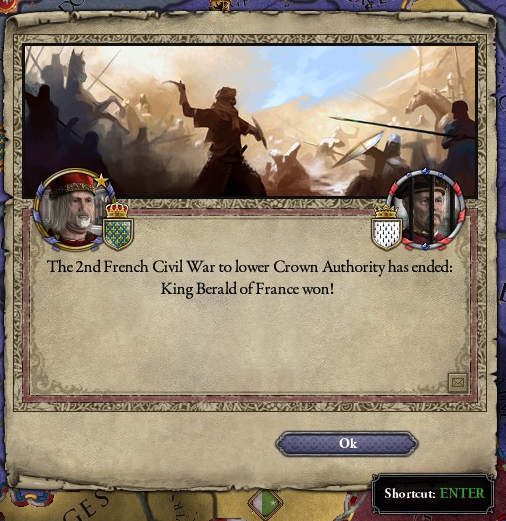  : I thought of Tacitus that day. "And where they make a desert, they call it peace". : I thought of Tacitus that day. "And where they make a desert, they call it peace". : I spoke to the nobles in the dungeons. I no longer held any official rank, of course, my presence at court was merely tolerated. I spoke to Doge Alderic, the man who owed his station to Creat. I spoke to his co-conspirators, nobles from all over France. : I spoke to the nobles in the dungeons. I no longer held any official rank, of course, my presence at court was merely tolerated. I spoke to Doge Alderic, the man who owed his station to Creat. I spoke to his co-conspirators, nobles from all over France. : And then I spoke to la Reine. : And then I spoke to la Reine.  : La Reine had used her wiles to convince Berald to release the nobles, in return for compensating him for the mercenary costs. : La Reine had used her wiles to convince Berald to release the nobles, in return for compensating him for the mercenary costs. : Berald loved gold, and released his prisoners that very night. : Berald loved gold, and released his prisoners that very night.  : He even called a tournament to celebrate his glorious reign. It was perfect. : He even called a tournament to celebrate his glorious reign. It was perfect. : All the land's nobility in one place. Plenty of time to speak to the ones the Doge, la Reine and I needed to speak to. : All the land's nobility in one place. Plenty of time to speak to the ones the Doge, la Reine and I needed to speak to.  : The melee had been bloodier than usual. Berald loved seeing spilt blood, even if he shared in it. : The melee had been bloodier than usual. Berald loved seeing spilt blood, even if he shared in it. : Our numbers grew. : Our numbers grew.  : Le Roi loved the tournament so much that he decreed an expansion of the jousting lists in Rouen. : Le Roi loved the tournament so much that he decreed an expansion of the jousting lists in Rouen.   : While he was in a generous mood, la Reine convinced him to improve the castles throughout Normandy. Great keeps grew even greater throughout the coast: Mortain, Lillebonne, Eu and the others. : While he was in a generous mood, la Reine convinced him to improve the castles throughout Normandy. Great keeps grew even greater throughout the coast: Mortain, Lillebonne, Eu and the others. : Le Roi went from castle to castle, inspecting progress, making clever faces and pretending that he understood what the architects told him. No matter. He was no longer in the capital, and we could meet more openly. : Le Roi went from castle to castle, inspecting progress, making clever faces and pretending that he understood what the architects told him. No matter. He was no longer in the capital, and we could meet more openly. : The Doge was the one that carved our name into the stones of the pyramid: "La Societe du Loup". : The Doge was the one that carved our name into the stones of the pyramid: "La Societe du Loup".  : After his three month-long tour of Normandie, le Roi returned to the capital in time for his cousin's wedding. He made an awkward speech, praising his cousin's choice in women. : After his three month-long tour of Normandie, le Roi returned to the capital in time for his cousin's wedding. He made an awkward speech, praising his cousin's choice in women. : As his cousin was his heir, la Reine made sure to speak to the poor girl. She introduced her to Duc d'Anjou, a charming man, recently inducted into La Societe. : As his cousin was his heir, la Reine made sure to speak to the poor girl. She introduced her to Duc d'Anjou, a charming man, recently inducted into La Societe. : During the wedding feast, le Roi slipped on wine he spilt, and hit his head on the floor. His end began. : During the wedding feast, le Roi slipped on wine he spilt, and hit his head on the floor. His end began.  : He grew worse every day. He forgot the names of his generals and council members. He trusted only two people: his cousin and his wife. : He grew worse every day. He forgot the names of his generals and council members. He trusted only two people: his cousin and his wife. : La Societe was in agreement: the man was no longer fit to rule the kingdom. : La Societe was in agreement: the man was no longer fit to rule the kingdom.  : We used wolfsbane. La Reine brought the chalice to his lips. : We used wolfsbane. La Reine brought the chalice to his lips. : But he knew. Somehow, the rat bastard knew. He knocked the chalice away, and yelled for the guards. He still knew how to do that. : But he knew. Somehow, the rat bastard knew. He knocked the chalice away, and yelled for the guards. He still knew how to do that. : A guardswoman slew Serhilda on the spot. She did not receive Consolamentum. She fell where she stood, and wanders this cursed land still. : A guardswoman slew Serhilda on the spot. She did not receive Consolamentum. She fell where she stood, and wanders this cursed land still.  : But the poison was working. Soon, Berald could no longer speak whole sentences. He lay in bed, with his blank eyes, and refused to die. : But the poison was working. Soon, Berald could no longer speak whole sentences. He lay in bed, with his blank eyes, and refused to die. : I was declared his caretaker. I was seventy years old. How dangerous could an old woman be? : I was declared his caretaker. I was seventy years old. How dangerous could an old woman be?  : It took two full minutes for him to stop squirming under the pillow. He suffered. : It took two full minutes for him to stop squirming under the pillow. He suffered. : It had to be done. For France. For Creat. : It had to be done. For France. For Creat.  : Aubry, his cousin, who had ruled as regent for a week, was crowned the next day. : Aubry, his cousin, who had ruled as regent for a week, was crowned the next day. : He was not as bad a king as Berald was, but he was not good enough. This was France. : He was not as bad a king as Berald was, but he was not good enough. This was France.  : Aubry was not very popular. Nobles throughout the lands banded together, and had secret meetings under the cover of midnight. : Aubry was not very popular. Nobles throughout the lands banded together, and had secret meetings under the cover of midnight.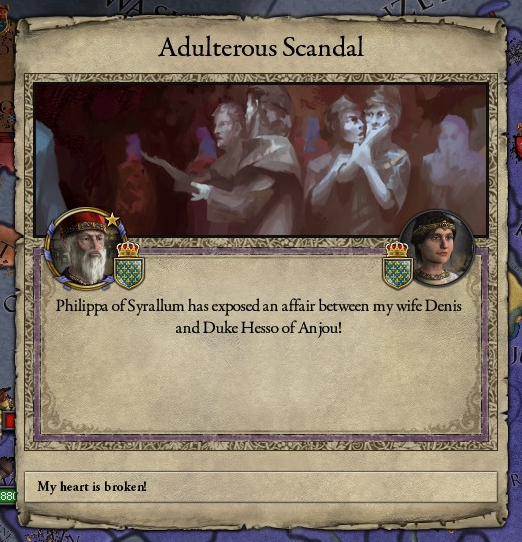  : And this is where La Societe found their greatest ally. Philippa of Syrallum, a young Orthodox woman from the Byzantine court, made herself known to us by telling the king about his wife's affair with Duc d'Anjou. : And this is where La Societe found their greatest ally. Philippa of Syrallum, a young Orthodox woman from the Byzantine court, made herself known to us by telling the king about his wife's affair with Duc d'Anjou. : I approached her soon after. She was eager to show her worth to us. : I approached her soon after. She was eager to show her worth to us.  : We sent her to speak to Aubry's daughter late in the night of God, the Devil and the Perfects. The girl went crying to her father, of course. : We sent her to speak to Aubry's daughter late in the night of God, the Devil and the Perfects. The girl went crying to her father, of course. : Eager to demonstrate his "mastery" of the Book, he engaged Philippa in debate. : Eager to demonstrate his "mastery" of the Book, he engaged Philippa in debate.  : She played her part well. Aubry convinced himself a scholar, and kept Philippa close after her "conversion". : She played her part well. Aubry convinced himself a scholar, and kept Philippa close after her "conversion".  : He had even invited her to suggest a way to get rid of la Reine quietly. : He had even invited her to suggest a way to get rid of la Reine quietly. : She suggested the men use wolfsbane. : She suggested the men use wolfsbane.  : Poor Denis. The girl did nothing wrong, but we needed Aubry to trust one of us. : Poor Denis. The girl did nothing wrong, but we needed Aubry to trust one of us.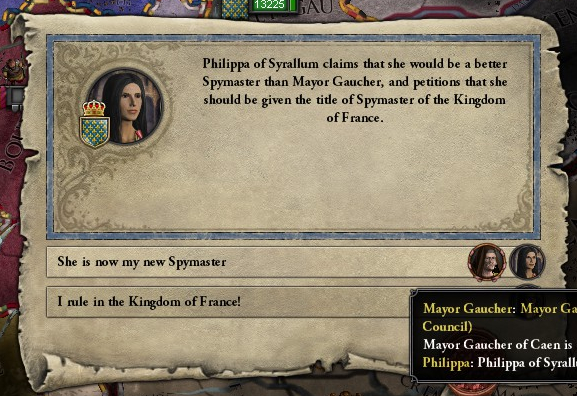  : As a reward for her services, Philippa was appointed the Mistress of Shadows. She immediately pointed out to a plot by his heir, a Catholic named Ide that was hiding in Western Germany. : As a reward for her services, Philippa was appointed the Mistress of Shadows. She immediately pointed out to a plot by his heir, a Catholic named Ide that was hiding in Western Germany. : As she did her work, we did ours. We scoured the Norman law books and great family ledgers to find the best heir for Aubry. : As she did her work, we did ours. We scoured the Norman law books and great family ledgers to find the best heir for Aubry.  : On Philippa's advice, le Roi invaded the Germans. He would find the woman and deal with her himself. : On Philippa's advice, le Roi invaded the Germans. He would find the woman and deal with her himself.  : The Germans, of course, could not stand against the might of the French war machine. Ida died a painful death in Aubry's dungeons, as he stood over her and laughed. : The Germans, of course, could not stand against the might of the French war machine. Ida died a painful death in Aubry's dungeons, as he stood over her and laughed. : Meanwhile, we had found an ideal man to take the crown. A distant nephew to Aubry, named Loup. We proclaimed him the heir to the throne. : Meanwhile, we had found an ideal man to take the crown. A distant nephew to Aubry, named Loup. We proclaimed him the heir to the throne. : Now he just needed to take it. : Now he just needed to take it.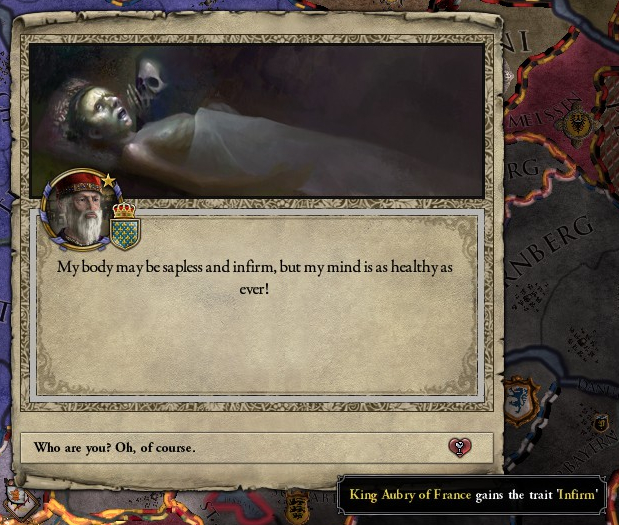  : A rock had hit Aubry during the siege of Berne. He had started to forget the names of his councillors, and gave confusing orders to his men. : A rock had hit Aubry during the siege of Berne. He had started to forget the names of his councillors, and gave confusing orders to his men.  : He still took Germany, of course. It would be difficult not to. An inbred papist could do it. : He still took Germany, of course. It would be difficult not to. An inbred papist could do it.  : Thinking himself his cousin, he declared a tournament in Rouen. : Thinking himself his cousin, he declared a tournament in Rouen.  : Once the preparations were underway, he toured the jousting lists, and proclaimed them too low. : Once the preparations were underway, he toured the jousting lists, and proclaimed them too low.   : As the tournament drew close, he wandered the halls of Rouen Castle. He seems to have seen his wife, long dead, in the arms of another man. Declaring himself a forgiving man, he pardoned the visions, and walked on. : As the tournament drew close, he wandered the halls of Rouen Castle. He seems to have seen his wife, long dead, in the arms of another man. Declaring himself a forgiving man, he pardoned the visions, and walked on.  : Eventually, he fell. He no longer could get up, nor did he want to. Drool seeped from his mouth, as he muttered words in languages long forgotten. The guards carried him to his chambers. : Eventually, he fell. He no longer could get up, nor did he want to. Drool seeped from his mouth, as he muttered words in languages long forgotten. The guards carried him to his chambers. : Philippa secreted me a key, and distracted guards. I decided to do the deed myself. I've killed kings and queens before, this was nothing new. : Philippa secreted me a key, and distracted guards. I decided to do the deed myself. I've killed kings and queens before, this was nothing new.  : He suffered less than Berald. A mere minute under the pillow, and the convulsions stopped. : He suffered less than Berald. A mere minute under the pillow, and the convulsions stopped. : France demanded sacrifice. : France demanded sacrifice.  : Loup le Premier, Roi des Francais. He was not Creat. : Loup le Premier, Roi des Francais. He was not Creat. : But he was close enough. : But he was close enough.  : Loup dispensed with the coronation nonsense, and demanded the most recent maps and charts. He saw that Germany held onto a small enclave near Frankfurt. He raised troops, and went to fix this cartographical error. : Loup dispensed with the coronation nonsense, and demanded the most recent maps and charts. He saw that Germany held onto a small enclave near Frankfurt. He raised troops, and went to fix this cartographical error.  : The war was going well. : The war was going well. : La Societe reconvened at the pyramid. We have decided to test Loup for kingship. Should he emerge a decent king, we would assist him, for France. Should he be like his predecessors, he would be dealt with, for Creat. : La Societe reconvened at the pyramid. We have decided to test Loup for kingship. Should he emerge a decent king, we would assist him, for France. Should he be like his predecessors, he would be dealt with, for Creat.  : Loup's wife, la Reine, was a clever woman, with a natural talent for intrigue. She could be a great asset, should Loup be deemed an ally of La Societe. : Loup's wife, la Reine, was a clever woman, with a natural talent for intrigue. She could be a great asset, should Loup be deemed an ally of La Societe.  : His fighting prowess was second only to Creat. He rode ahead of his troops, the first in every charge. : His fighting prowess was second only to Creat. He rode ahead of his troops, the first in every charge.  : The Germans surrendered to his might quickly. : The Germans surrendered to his might quickly.  : Our hand was forced earlier than we anticipated. The Doge of Bretagne seems to have supported some schemes on the side. Duc de Brabant had demanded le Roi grant the nobles the right to final justice in their domains, and the Doge found him allies. : Our hand was forced earlier than we anticipated. The Doge of Bretagne seems to have supported some schemes on the side. Duc de Brabant had demanded le Roi grant the nobles the right to final justice in their domains, and the Doge found him allies.  : Loup refused. The Doge was no longer a member of La Societe. We had sided with le Roi. : Loup refused. The Doge was no longer a member of La Societe. We had sided with le Roi.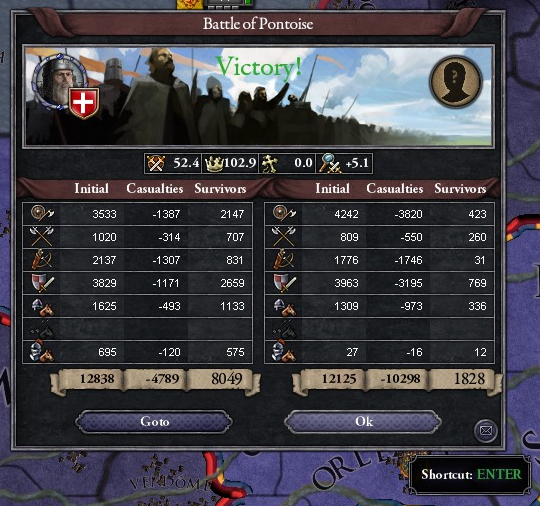  : Unlike Berald, Loup had no need of tens of thousands of men marching for coin. The French would do. A fair battle against a fair opponent. : Unlike Berald, Loup had no need of tens of thousands of men marching for coin. The French would do. A fair battle against a fair opponent. : Each fallen loyalist took two rebels with him. Men were willing to die for Loup. : Each fallen loyalist took two rebels with him. Men were willing to die for Loup.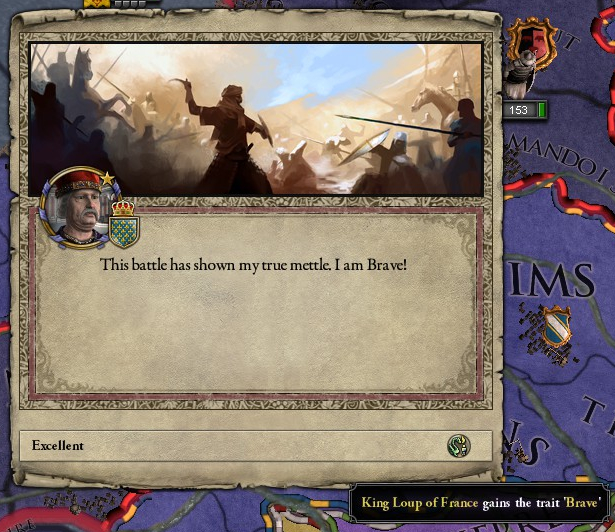  : And I could see why. I saw him charge a mass of pikes on his steed, breaking them with his sword as he cut into their ranks, a spearpoint against the rebel. : And I could see why. I saw him charge a mass of pikes on his steed, breaking them with his sword as he cut into their ranks, a spearpoint against the rebel.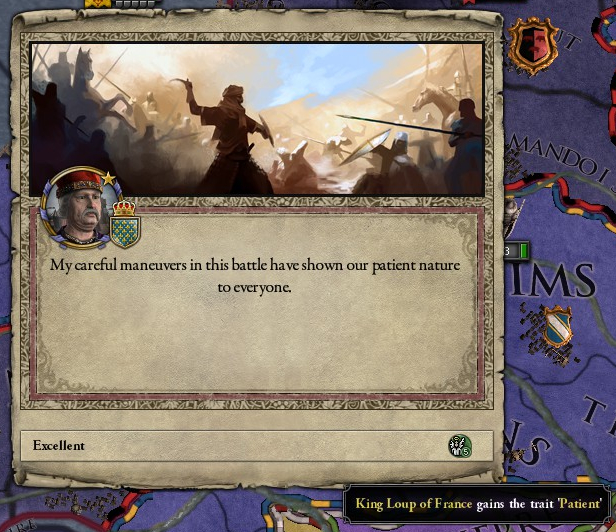  : And I saw him hold his cavalry until the decisive moment, for the rebel infantry had thought them dead, only to charge at the right moment. : And I saw him hold his cavalry until the decisive moment, for the rebel infantry had thought them dead, only to charge at the right moment.  : The last of the rebels were rounded up and finished off. : The last of the rebels were rounded up and finished off.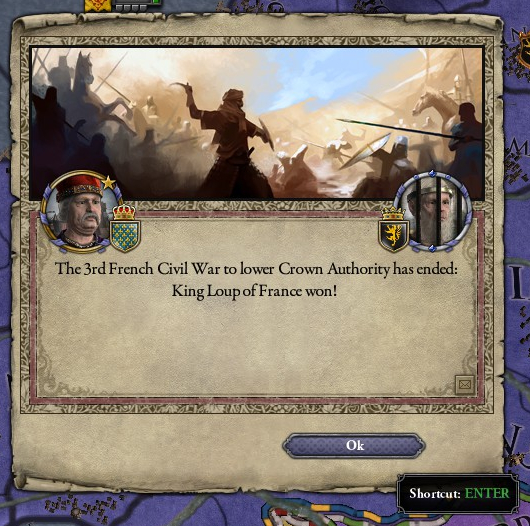  : The right to final judgement remained with le Roi. : The right to final judgement remained with le Roi.  : Loup had seen the value of Creat's Thousand, the most loyal knights, answering to none but le Roi. He wished to add more to them. For that he needed money. : Loup had seen the value of Creat's Thousand, the most loyal knights, answering to none but le Roi. He wished to add more to them. For that he needed money. : Every noble that could pay his ransom was returned to his lands. Le Roi was fair. : Every noble that could pay his ransom was returned to his lands. Le Roi was fair.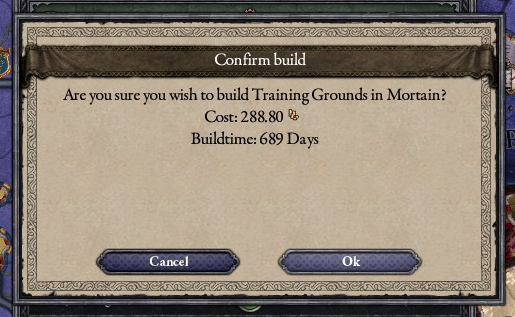  : Throughout Normandie, training grounds for more knights with the fleur-de-lis were raised. Men and women rode, fought and lived there. Loyalty to the throne above all. : Throughout Normandie, training grounds for more knights with the fleur-de-lis were raised. Men and women rode, fought and lived there. Loyalty to the throne above all.  : As he worked on his knights, nicknamed Loups du Roi, we received more news from the East. It appears, the sun worshippers had declared another Great Holy War on the fractured Muslim states. : As he worked on his knights, nicknamed Loups du Roi, we received more news from the East. It appears, the sun worshippers had declared another Great Holy War on the fractured Muslim states.  : They had warred well against the nomads to the north as well. The Solar Empire grew. : They had warred well against the nomads to the north as well. The Solar Empire grew.  : With his Loups in training, le Roi assembled his council. He wished for news about Hispania. He had picked the right moment, for it seems they were currently at war with the Lombards, defending some minor Sunni client state to the east. : With his Loups in training, le Roi assembled his council. He wished for news about Hispania. He had picked the right moment, for it seems they were currently at war with the Lombards, defending some minor Sunni client state to the east.  : With their army weakened, Loup had called for war against the infidel. Gascogne would be French. : With their army weakened, Loup had called for war against the infidel. Gascogne would be French.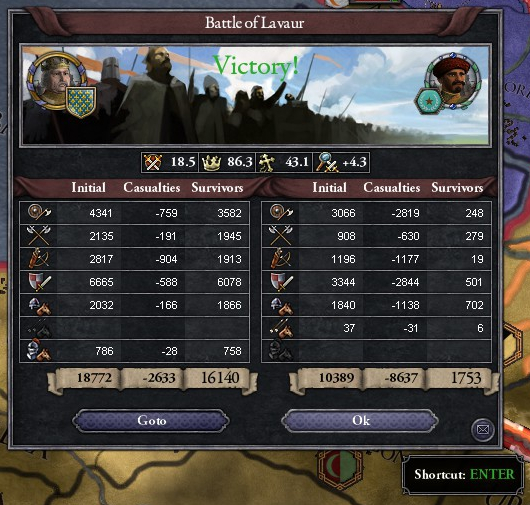  : We fell on the Muslims as wolves on a deer. For each man we lost, they lost four. : We fell on the Muslims as wolves on a deer. For each man we lost, they lost four.   : The Hispanians had no chance against the might of Christendom, and called for peace. : The Hispanians had no chance against the might of Christendom, and called for peace.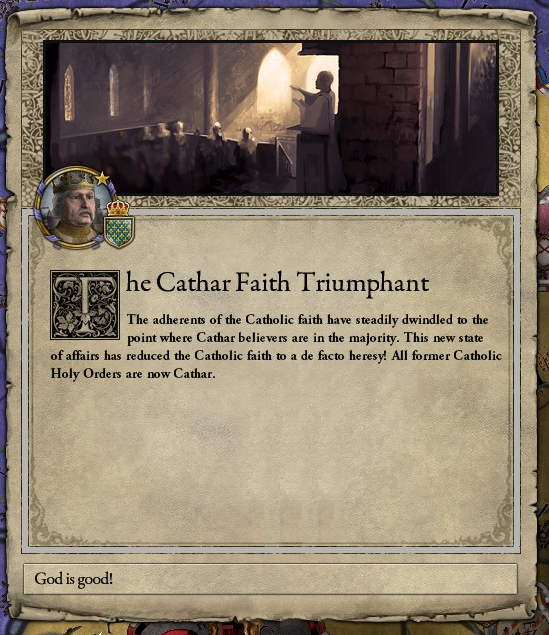  : Yes, Christendom. The papists may have held Rome, but we held the people's hearts. We were heretics no longer. The Perfects were the true heirs of Jesus, and Europe heard their call. Men and women in Germany, England and Italy took Consolamentum. The Catholics were dying out. : Yes, Christendom. The papists may have held Rome, but we held the people's hearts. We were heretics no longer. The Perfects were the true heirs of Jesus, and Europe heard their call. Men and women in Germany, England and Italy took Consolamentum. The Catholics were dying out.The galley pulls into a small cove on the coast.  : I trust that was enough for the voyage. : I trust that was enough for the voyage.Mme. de Beaumont nods to the captain and steps ashore. Confused, many of the Caravan follow.  : We are here. Welcome to Bretagne. : We are here. Welcome to Bretagne.She throws her bag on her shoulder and walks towards a small town in the distance. Lost and unsure, the rest of the pilgrims trace her steps. The Caravan marches on.
|
|
|
|
Have you been Seniority this whole time? That's a lot of elderly kings.
|
|
|
|
Sindai posted:Have you been Seniority this whole time? That's a lot of elderly kings. Anyway, Kayten, I'm really digging Loup so far! Looking forward to the next update.
|
|
|
|
History Update 11 - The Angevins So, last time we continued with Dukes of Normandy/Kings of England, and took a look at William's awful descendants, namely Stephen de Blois, well-known lovely king. Today, we're going to look at Matilda's and Geoffrey of Anjou's descendents - Angevins, the early Plantagenets. To simplify things, I'm going to refer to a member of the same dynasty but a generation older as an uncle; a member of the same dynasty in the same generation as a cousin; and a member of the same dynasty but a generation younger as a nephew. Because removing the "n times removed" from these makes my life much, much easier. 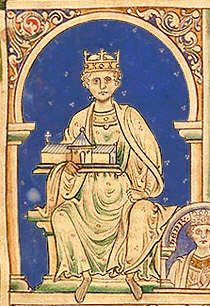 Henry II of England, King of England (1154-1189) With Geoffrey's death in 1151, by this point Henry was already the Count of Anjou. He was also married to Eleanor of Aquitane, the duchess of Aquitane, and ex-wife of Louis VII, King of France, which caused problems. While Henry had sworn fealty to Louis VII earlier in order to retain the Duchy of Normandy, he was now in control of far too much land. Louis led a coalition against Henry, which included his uncle Stephen, several French Counts, and Henry's brother Geoffrey, who claimed he got screwed on his inheritance. Keep in mind, that this was happening during Henry's invasion of England, so he was busy on two fronts. Luckily for the Angevins, Louis got sick and pulled out of the campaign, letting Henry win his war against Geoffrey. He then concentrated on fighting Stephen in England, eventually agreeing to become his heir in a peace treaty. Stephen died in 1154, giving the throne to Henry. Henry inherited a kingdom ravaged by nineteen years of civil war, with outside forces meddling in the lands pretty heavily. The Welsh revolt, completely unchecked by Stephen continued burning, while King Malcolm of Scotland, Henry's cousin (?), kept the lands in north, taken during the Anarchy. Henry first focused on fixing these trends, and took back the land from the Scots in 1157, and the land from the Welsh in 1158. Later on, he would run into quite a few problems with a turbulent priest in Canterbury, Thomas Becket, whose martyrdom we had already talked about in our pilgrimage update.  Henry's claims in France, in red In France, Henry's pissing contest with Louis VII continued. The two continued building alliances with minor counts against each other throughout the 1150s. By 1158, Henry had pressed his grandfather's claims in Brittany, and secured the duchy as his vassals. He then tried allying himself into getting control of Toulouse, which brought him head to head with Louis, a supporter of the local count. Fighting broke out, and the king and Henry signed a treaty in 1160, granting Henry his grandafather's claims in return for holding onto Henry's children. However, Louis instantly began to move against Henry with a few choice marriages that broke one of his key alliances. In return, Henry forced a few papal legates to marry Young Henry and Margaret, Louis' daughter. This gave him a claim on Vexin, which he promptly seized. By 1167, Louis has had enough, and declared war on Henry over some loving nonsense about taxing crusader states. Louis's allies included Wales, Scotland and a really pissed off Brittany. The war did not go over as planned, as Henry seized the king's arsenal and burned it to the ground, forcing him to peace out. He was then free to bully the Bretons around some more. In order to ease the tensions somewhat, Henry decided on his inheritance: his oldest son, the Young Henry, would receive England and Normandy; Richard would receive the Aquitane; and Geoffrey would receive Brittany. Each of them would swear fealty to Louis, enforcing his authority as king. Louis agreed to this, and immediately set off to start poo poo between the brothers. This worked out pretty well for Louis, as his sons felt mistreated, and in 1173 raised a flag in rebellion, supported by Louis, King William of Scotland and the Count of Flanders. Despite the large geographical spread of teh Great Revolt, Herny took out Scotland, and then France in 1174. White peace followed. His youngest son, John, quickly became his favourite, due to the whole "not revolting" thing. Louis died soon after in 1180.  Phillip "Augustus" II of France, King of France (1180-1223) Louis's son, Philip Augustus, continued his father's policy of siding with Henry's sons against Henry. This came to head in 1188, when he proposed to grant Henry all the lands he's had claims on for so long, if he named Richard, his third son, his successor, and married him to Alice, Philip's sister. Henry refused, and Richard himself demanded to be recognized as his heir. Henry said nothing and Richard publicly swore fealty to Philip on the spot. Richard, with the assistance of Philip, launched an attack against the king. Henry, already dying from a stomach ulcer, lost spectacularly, and named Richard his heir in the surrender. When he was later told that John had sided with Richard, the shock was enough to kill Henry. He died as he lived, hated by everyone he knew. 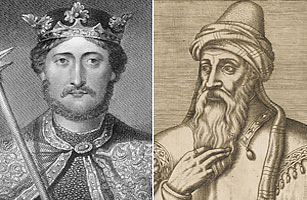 Richard 'the Lionheart' of England, Henry II's third son, King of England (1189-1199)[left]; Salah ad-Din Yusuf ibn Ayyub, Sultan of Egypt and Syria (1174-1193)[right] Richard got off to a pious start, by banning women and Jews from his coronation. Hell, Jews had a rough time under Richard in general: the population of London had a spontaneous pogrom after hearing the Richard was planning to kick Jews out. He punished the murderers, and allowed Jews to return to Judaism if falsely converted. With that nonsense out of the way, he and Philip turned to the important question: crusadin'. In order to ensure that neither king fucks them over while they're in the Levant, both went to fight Saladin at the same time in 1190. Richard used England to raise funds for his crusade, famously saying "I would have sold London if I could find a buyer". He and Philip made a short stop at Sicily, where they overthrew the government before moving onto Cyprus. The island was held by the Byzantines who were willing to start poo poo, so Richard quickly conquered that as well, leading to Catholic rule of the island until 1571. He reportedly kept the governor of the island in silver chains, because he promised not to place him in irons. The king has fallen sick with scurvy, but nonetheless led his troops at the siege of Acre. There are stories about he was carried on a stretcher, firing at the walls' defenders from a crossbow. He took Acre and Jaffa, and eventually marched on Jerusalem, where, due to some weather, he was force to withdraw. After a lot of faffing about on the coast, and minor skirmishes with Saladin, the men made peace. Richard had problems to deal with back home, since John was taking advantage of his travels in England, while Philip was screwing around in France. On his way back, he was thrown off course several times, before finally wrecking in north-eastern Italy, and attempting to cross Austria by land. He was found in the forests, despite his disguise as a Knight Templar, and arrested by the Duke of Austria for murdering Conrad of Montferrat. While imprisoned, Richard wrote an honest-to-god prison song, "Ja nuls om pres" (No man who is imprisoned), bitching about his sister and his people abandoning him. He was then transfered to the dungeons of Henry VI, Holy Roman Emperor, who held him for ransom. Richard refused to defer to the Emperor, proclaiming "I am born of a rank which recognises no superior but God". Pope Celestine III excommunicated both the Duke of Austria as well the Emperor for the wrongful imprisonment. The Emperor nonethess demanded 65,000 pounds of silver for Richard release, roughly three times the annual English crown income, same amount that was raised before Richard went a-crusadin'. 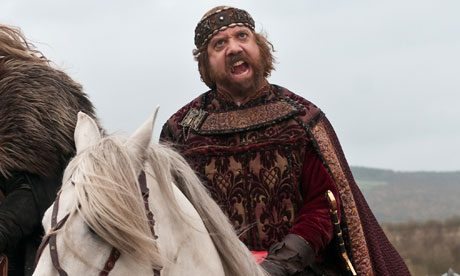 John "Lackland" of England, King of England (1199-1216), seen here played by Paul Giamatti in Ironclad Prince John, meanwhile, had sent a letter to the Emperor, offering 80,000 pounds of silver to keep Richard imprisoned. The Emperor refused that deal, and in 1194 released Richard upon receiving his 65,000. While RIchard was away, Philip had helped John revolt, and took Normandy. Once Richard returned, he forgave his brother, and marched on Philip. During this war, Normandy was pretty much excommunicated, with any church services forbidden in the duchy. Richard was making serious gains on Philip, when he was shot in the neck by a teenager during the siege of an insignificant castle at Chalus-Chabrol. The wound became gangrenous, and in 1199, Richard died. John was crowned soon after, and rode off to war against Philip, eventually stalemating into a kind of white peace. Philip named John Richard's legal heir, and controller of his continental lands, while John swore fealty to Philip as his lord in France. However, after a bit of fuckery by John, Philip proclaimed John in breach of his feudal contract, and granted his western French lands to Arthur, John's older brother, while taking Normandy for himself. In three years, John managed to lose all of his continental possessions other than Aquitane. John continued warring against the French king for the rest of his reign. This caused a lot of tension between him and his Barons in England, who weren't big fans of supporting the king in a losing war for so long. By 1214, he had lost enough to Philip that he ceded him Anjou. John's barons in the north renounced him as their feudal lord, and marched on London. John was quickly losing his allies, and agreed to grant the barons (and some freemen) a long list of rights, codified as the Magna Carta. The barons didn't buy it, and continued warring. John had sent his forces north, where the rebels had allied with King Alexander II of Scotland and Prince Louis of France. Losing a war on two fronts after the French invasion of the south-east, John eventually succumbed to illness in 1216. John's son, the 9-year old Henry III of England inherited the throne. With this, the Angevin line is generally considered finished (they lost Anjou by this point), and from Henry III on, English rulers were referred to as Plantagenets. SO we'll leave it here for tonight, with another idiot son pissing away his father's work. TL;DR: Matilda's descendants were incredibly unpopular, took over western France, and then pissed it all away.
|
|
|
|
quote:He and Philip made a short stop at Sicily, where they overthrew the government before moving onto Cyprus. The island was held by the Byzantines who were willing to start poo poo, so Richard quickly conquered that as well, leading to Catholic rule of the island until 1571. He reportedly kept the governor of the island in silver chains, because he promised not to place him in irons. Random conquests for no reason than because it was there?
|
|
|
|

|
| # ? May 16, 2024 19:52 |
|
Bloodly posted:Random conquests for no reason than because it was there? It's the Norman way!
|
|
|


